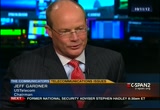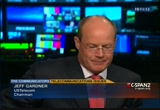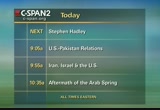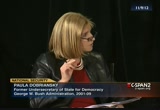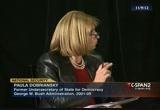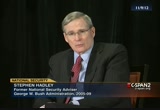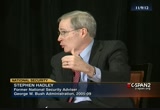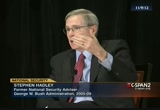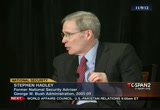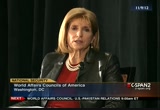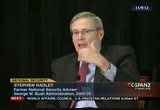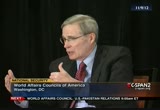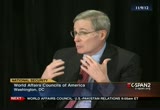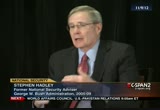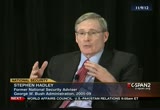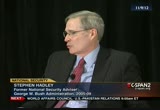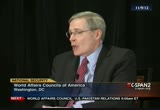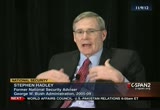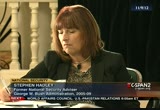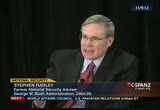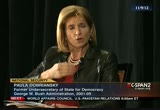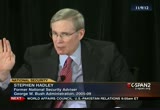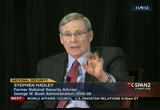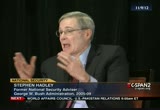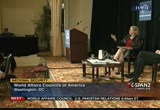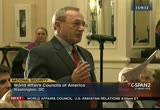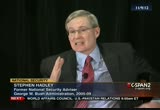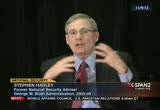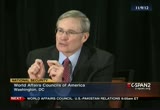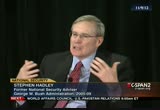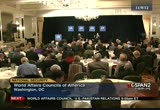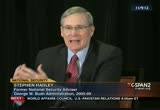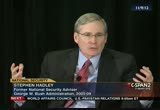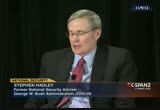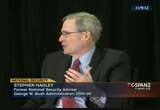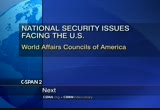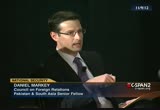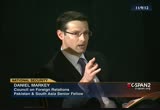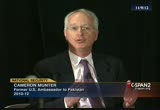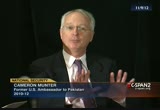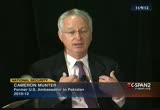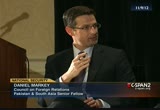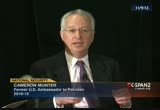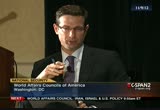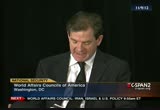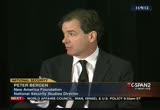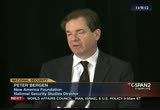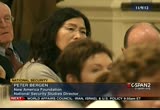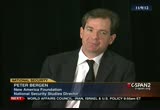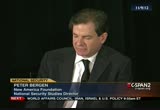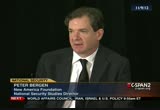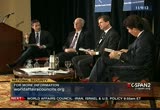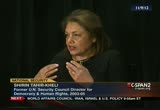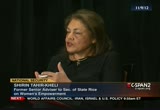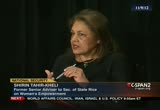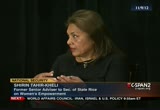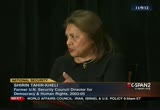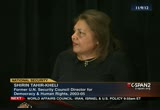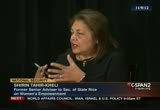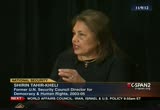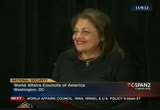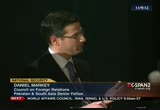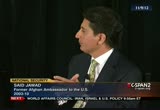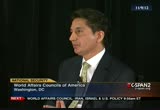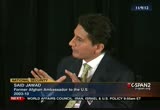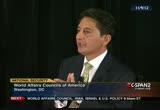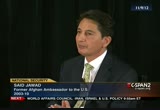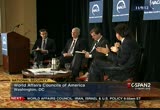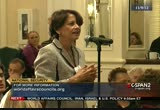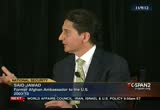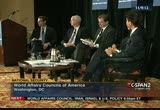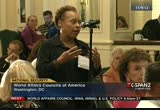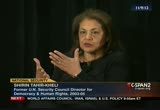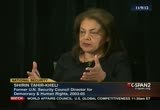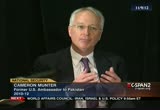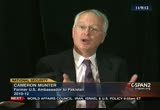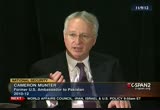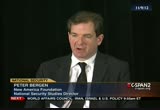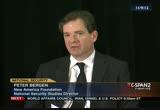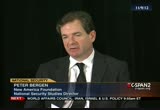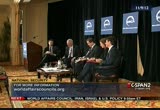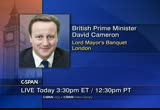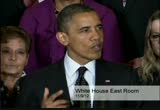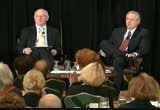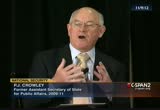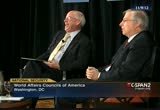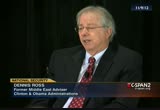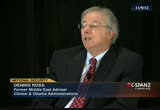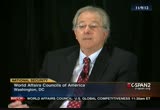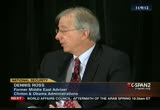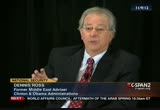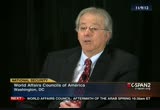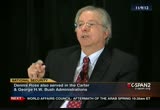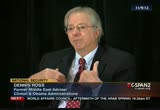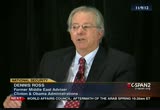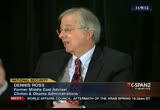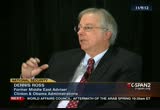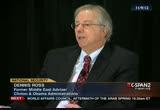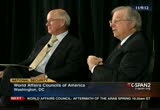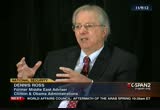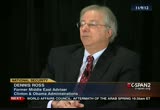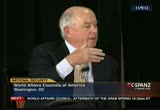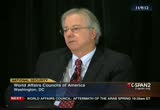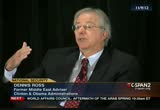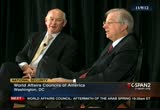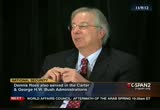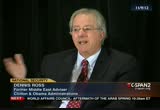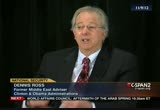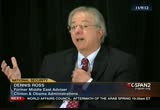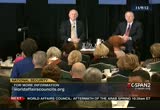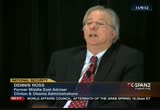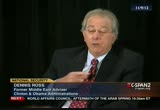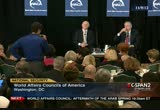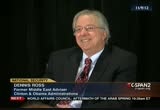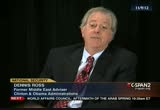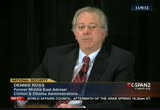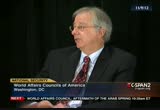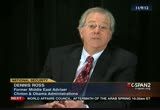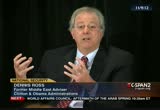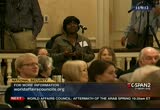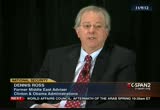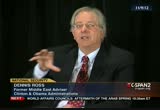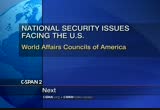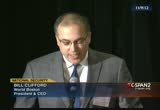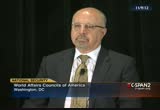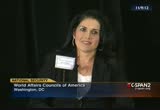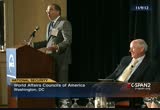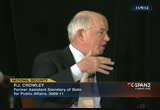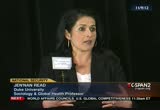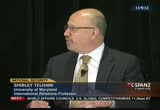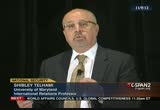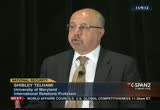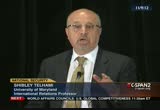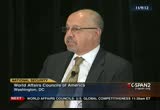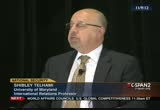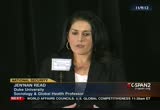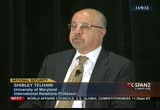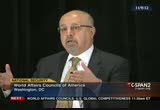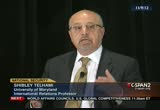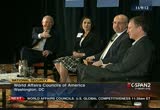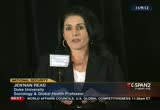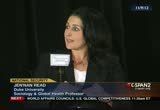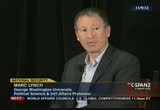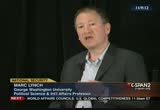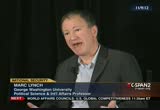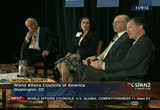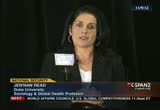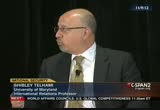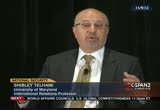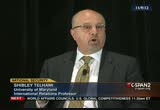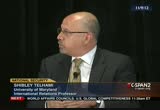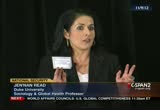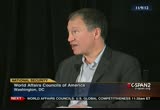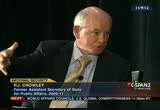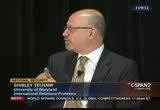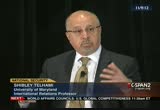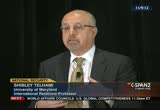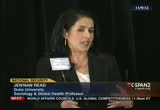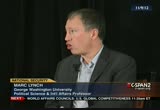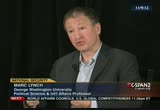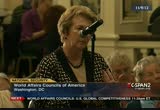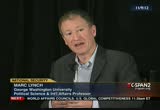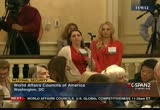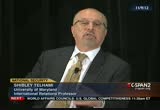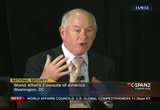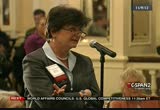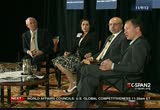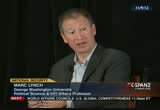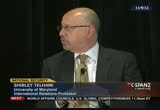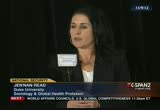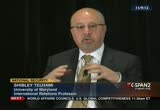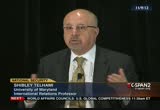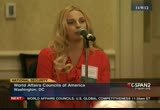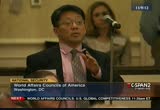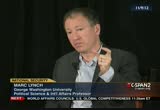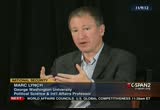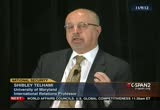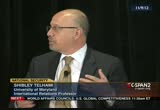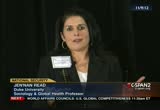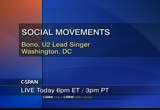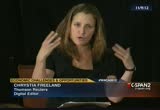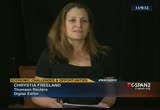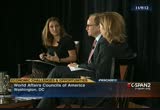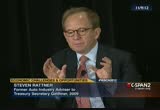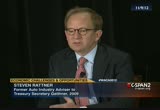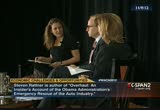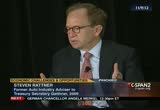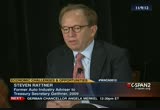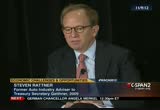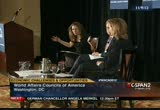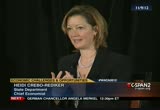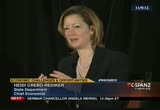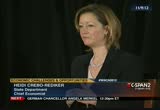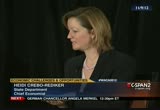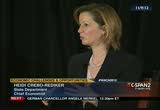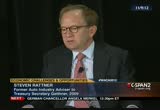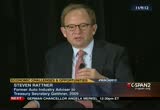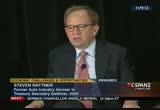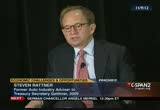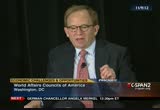tv U.S. Senate CSPAN November 12, 2012 8:30am-12:00pm EST
8:30 am
excellent idea. unfortunately, only one-third of that is going to be used. so $200 million is going to go unspent that can go out and serve unserved america today. the same issue will be in front of us in 2013. that's what windstream's waiver is all about, is there other ways to think about this other than setting the 775 limit. and beyond that i think getting on to the model that we need going forward for universal service funding. the industry, the usta has put forth a model, but the fcc has to come up with their own model which will drive caf ii is what we're calling it, the connect america fund 2, so that's where the biggest bang for the buck will be in our business. because remember, as we looked at these more than minor changes
8:31 am
in the financials of the telephone companies across the country, it was so important that we do these two things coincidentally. we kind of got a little bit out of sync. we've gotten one done very effectively, efficiently and fast. it's happen realtime, it's showing up in the numbers today, we've just got to work this usf thing out x it's about the consumer. >> host: jeff gardner is president and ceo of the windstream corporation, he is also chairman this year of the u.s. telecom trade association. he's been our guest on "the communicators" along with paul barbagallo of bloomberg. gentlemen, thank you. >> guest: thank you. >> just ahead, a series of discussions by the world affairs council of america exploring national security issues facing the u.s. up first, former national security adviser steven hadley. he talks about the economic impact on national security.
8:32 am
then a panel of former ambassadors discusses relations between the u.s. and pakistan. after that former middle east envoy dennis ross talks about iran, israel and u.s./middle east policy. and later, a look at the aftermath of the arab spring including the ongoing syrian civil war and the challenges facing egypt after its revolution. >> later today, singers and musicians roger daltrey and pete townsend of the who will be at the national press club to talk about the program they co-founded to help improve the lives of teenagers and young adults with cancer. they'll also discuss their plans for a new initiative called teen cancer america. it aims to set up hospitals and medical centers in the strategic areas across the country. see their remarks live beginning at 1 p.m. eastern over on c-span. >> you're watching c-span2 with
8:33 am
politics and public atears. weak dies fee you are -- weekdays featuring live coverage of the senate and every weekend the latest nonfiction authors and books on booktv. you can see past programs and get our schedule at our web site, and you can join in the conversation on social media sites. >> former national security adviser stephen hadley was among the speakers at a recent conference focusing on national security challenges facing the united states. he said the top priority should be getting the nation's fiscal house in order. this forum was one of a series of discussions hosted by the world affairs councils of america. it's about 35 minutes. [applause] >> thank you so much and good morning, everyone, and welcome, steve. it's really, really a pleasure to have you here in this morning, and we're going to dive
8:34 am
right in. i want to begin, first, by giving you credit for speaking to the world affairs could coun. i believe it wasn't only last year, but the year before when steve hadley challenged all of us to come up with a focus, a set of issues, in fact, that the councils across the united states should be honing in on. well, as you know, this year's conference is galvanized around a set of issues, u.s. national security, six topic issues for the president in 2013. and let me just recap those for you, because we want to drill down in these. the councils have selected u.s. economic competitiveness, u.s. education competing globally, the middle east, china, afghanistan/pakistan and u.s. energy policy as the six top issues. so starting with that, looking at it strategically, do you feel
8:35 am
that those are the core issues before president obama and this administration and our country going into 2013? um, if not, what would you change, what would you add? >> i -- when i was informed by lori murray about the outcome of the process by which the world affairs councils went through and came up with those six issues, i thought you had it exactly right. i think those are the big issues, and congratulations to you. i think you have them just right. i think there is an overarching issue on top of all of them that in some sense effects and enables all of them x that is if you look at at the national security challenges and the foreign policy challenges we face, i say that the number one challenge is getting our fiscal house in order.
8:36 am
getting a handle on the debt, getting a handle on the deficit which are critical in order to get the economy growing again and people back to work. and i think that is the over -- it's certainly the number one domestic challenge. my point is it's always the number one national security challenge. why? because a healthy economy and a healthy balance sheet undergirds everything we do internationally. it funds our military, it gives strength to our diplomacy, it allows us to be an attractive trading partner which gives us economic influence. it undergirds everything we do overseas. but secondly, it also undergirds the power of the american idea. the american idea is political democracy and free markets makes for a stable situation in the
8:37 am
long term but also makes for a prosperous society that is able to deliver on its people. that is really what america has stood for. and by our failure to resolve our own problems and get our economy growing and going again, we undermine the strength of the american idea internationally. and that's why countries are flirting with this notion of, well, maybe china has it right; state capitalism plus keeping your people in line. and that is very destructive. it's destructive for our influence, but also in my view it's not the right path for countries to take. so i think the council's got all the issues right. i think you've got a great program this year as you did last year. i just think overarching all of this is that issue, and i think the american people understand that, and they've been in this campaign sent that message to both candidates, and that's why it is now the subject of
8:38 am
conversation the day after the election. >> well, let me pick up on that because one of the issues, as you know, as part of the six, of the six topics is u.s. competitiveness. and you've just mentioned the importance of addressing the national debt. isn't it true that also perceptions abroad of us are directly impacted by how we handle the debt? >> absolutely. >> when you look at what different countries are saying, both friends and foe, tear honing in on this -- they're honing in on this, and it effects our standing internationally. i mentioned yesterday ahmadinejad is quoted and made a statement that because of our $16 trillion debt that the united states has a weakened position. now, you know, whether it's right or wrong other countries are looking at us. how do you address that? >> i think that's exactly right, and they're also looking at our democratic system. and as we see europe struggling to make the hard choices they
8:39 am
need to make and america struggles to make the hard choices we make, some people are beginning to say it shows that democracies don't work. that people cannot, they cannot make the hard decisions countries need to make. so it's not only undermining our standing, but it is also undermining support for the principles of our government. but i want to not sound downbeat, and i want to end this piece on this note, and i first heard it from bob zoellick who is a wonderful fella, head of the world bank and has a very distinguished career. but then we heard it a couple of weeks ago, i think out of the foreign minister of australia. people are saying that the united states is one budget deal away from a real return to influence and standing, and why they say that is if we can get a handle on this deficit issue and the debt issue, there's a lot of money on corporate balance sheets ready to come into the
8:40 am
market and put people to work. you picked energy as a topic. absolutely right. with shale gas and shale oil, there is abundant energy coming. getting that energy out puts people to work. it might make us a net energy exporter again. it makes manufacturing more attractive because energy is cheaper, so jobs, manufacturing jobs are starting to come back to the united states. we are on the threshold of very good news for america and very good news for the world, and i think that we'll revalidate our economic and political system. but we've got to get past the political gridlock, and we've got to deal with this deficit and debt issue, and we've got to show that we can make that hard decision. we need to address entitlements as part of that, and if we do, then these other things will kick in. >> okay. let's go to the middle east. two issues that have been a lot
8:41 am
in the news, and there's been a lot of concern about iran, and you've written a number of op-eds giving a view on what you think is the best approach. and then there's the issue of syria. please say some words about what you see as the next steps with regard to iran, how do we see that unfolding in the time ahead, and then what's the way forward with syria? >> yeah. three things. one, you know, the arab spring turned out to be less spring. probably the better term is the arab awakening, and we're going to go through springs and winters and summers and falls, and it's going to vary country to country, and it's going to take a long time. but look, it was inevitable, unavoidable and actually a good thing that the people of the arab world should start taking
8:42 am
some responsibility for their future. and there's just no going back. and it is very much in our interest how these awakenings come out and that they result in societies that are democratic, that are producing a better life for their people, and we should do everything we can in a smart way recognizing we're not so popular in the middle east right now to try to help get that outcome. there are a couple big threats to that. one is syria, and i'm more worried about syria in terms of middle east than anything. and that is because what we're seeing is everybody says assad wants to to go, but nobody's pushing him off the stage. and the longer he says, the more sectarian the conflict has become, the more it has opened the door to al-qaeda and other terrorist groups. and what you're beginning to see is a sectarian war, sunni versus shia, backed by the saudis and
8:43 am
others and iran that is making a sectarian battleground in syria, and it is starting to destabilize lebanon, iraq, jordan and maybe even turkey. and that is bad news. a middle east that is, descends into a sectarian war between sunni and shia is a disaster for all of us. and so i have been arguing for months that the united states needs to do more to hasten assad's departure, that countries in the region like turkey and jordan are begging us to do more. it's not boots on the ground, it's not invading another country. it is trying to help the syrian opposition get organized, be democratic and be inclusive and to give them the wherewithal in terms of a modest number of arms to get rid of assad. and it's in our interest that that happen sooner rather than
8:44 am
later. and the last thing, iran, and we can talk about that if you want. >> please. >> but i really think it is important for groups like this to talk about iran. and it's -- why i say that has to do with our experience in iraq. a lot of people say iraq was a war of choice, some people say it was a war of prevention. i say it was a war of last resort. that in the end of 2002 we came to the end of economic sanctions and inspections and diplomatic initiatives. we ran through all of that and really were out of options. and the issue was whether you let saddam hussein get away with defying the international community, or you impose some consequences, and president bush decided on the latter. you can discuss the wisdom of that. my point is i think about a year from now we're going to be in the same place on iran. if we try, as i think the
8:45 am
administration will, to make a proposal to the iranians to try to seek a diplomatic outcome -- which i think they should do -- if that fails, and i think we'll probably know in a year's time, i think the obama administration and president obama is going to have a decision very much like the one president bush had in 2002. so what we need to be doing now is stepping back and thinking creatively. are there other alternatives and scenarios we can work that can get a good result in iran? without leaving the president of the united states where he only has two choices, either go to war with iran or accept iran with a nuclear weapon. neither of those choices are attractive. so what i've been saying is now is the time to try to think creatively about other she their yores that can get us -- scenarios that can get us to an
8:46 am
acceptable outcome in iran and avoid the choice of those two alternatives. .. i think what we need to think about is not options, but things like scenarios. one scenario would be for the administration to try to reengage with the iranians diplomatically. with the other countries involved, so-called p5, five permanent members of the security council plus germany,
8:47 am
to make a fairly robust offer to the iranians of the kinds of things available to the iranian people if this regime will give up this nuclear program. and to test them and to see if there is a diplomatic outcome. that's acceptable. if there isn't, i think that process will be important in order for the administration to set up, with whatever options might follow, whether it is acceleration of the sanctions and really putting more pressure on the iranian regime, or potentially looking at military options, and i think we need to be created about military options. i would be very much on a low-end of military options, as part of the scenario overtime for bringing pressure in iran of trying to get this iranian regime to give up this nuclear weapons program. so i think it's that kind of
8:48 am
scenario development i would try to you, and i think that's kind of the direction we're heading at this point. dennis ross will be speaking to you i think later this morning, terrific on the subject, and i think you will have a very good discussion with him about what kind of options are available to get administration. >> let's go to afghanistan-pakistan. you certainly, during the bush administration, you were very involved in the evolution of our policy in afghanistan. we are at a very critical juncture, certainly with the drawdown of the troops. talk a bit about that in terms of what are the important next steps, and how we deal with that change, and at the same time preserve stability in afghanistan and in the region. and really preserve that security and stability on the ground. what are the elements that we need to be concerned about in
8:49 am
this time of drawdown? >> i can say a little bit, but again, you've got a wonderful panel that is following me with cameron munter and other so i will defer to them. but one of the things i think i would just make two points. one is, we need to step back and recognize that afghanistan is important, pakistan is important and we have some strong interests in both places. and argubright, our interests, strategically, are as important and maybe more important in pakistan because it is a much bigger country, because of the tensions within. so we have a real interest in trying to get afghanistan and pakistan right. second, there's been a lot of discussion about american strategy in afghanistan. i think we've got a pretty sensible military strategy. john podesta and i thought we
8:50 am
didn't have a good political strategy or getting a good electoral outcome in 2014 and get an afghan government that is legitimate and supported by the afghan people. so you have a strong government to them to pass security responsibility for afghanistan in 2014. we've written about that. i think that's very important, political peace between on 2014. i think it's also very important for the administration to carry through on what it said it would do, which is to leave a substantial military force on the ground in afghanistan after 2014. i'm reluctant to do that. america has sacrificed so much blood and treasure there, but it's precisely because we have sacrificed so much blood and treasure that i think we have to have a presence there on the ground. because this cake is not going to be cooked by 2014. lastly, i do think we do not,
8:51 am
still do not spend enough time focusing on pakistan. pakistan i think is like a bad marriage with no prospect for divorce. [laughter] there's no alternative. to working with, and icy nodding and give me thumbs give me thumbs up to chautauqua more about that. it is a very difficult relationship, but we need to look at it in two parts. short run, you've got to get pakistan to work with us to do with the terrorist problem in the region. it doesn't just threaten us your first and foremost, it threatens pakistan itself. so we've got to work the terror issue. but secondly, we have to make it clear to the people in pakistan that we care about what happens to pakistan. and what happens to them. and put aside her own interest in counterterrorism. we want a pakistan that is
8:52 am
democratic, that is prosperous, that is effective that is bring a better life to their people. and so there's a part of our policy that needs to be looking at a long-term trying to help support pakistani. so it got every two-tiered strategy with respect to pakistan, and i think we spent to much time on first and not enough time on the second of but again, there is a panel coming with great experts who will tell you what the real answer is. i'll just try and set the stage a bit. >> i want to ask you about china but i also want to give a chance, because we're going to spill over just a little bit, if people have questions to just come up to the mic. we will take a few questions. let go to china. henry kissinger, who you worked for, was, during the campaign, very critical of both candidates saying he didn't like the position of either candidate, governor romney over president
8:53 am
obama. what do you think? what is the right way forward in our relations with china at this time? what's the right thing to do? >> one, i think you have, and you all know this, you know. what you hear from barack obama or mitt romney, the candidate, is going to be different than what you're going to hear from barack obama for president, i would have heard with romney for president. that's just the way of campaigns, and you all know that. i think you have to think of china in two ways. and one was come it is sort of summed up. i had a meeting in beijing a couple weeks ago and i met with a man named john who will be the premier of china. so he's talking in chinese, very interesting man. and he says something in chinese and the translator translated, america and china are not rivals. i thought well, that's
8:54 am
interesting. and he stopped the translator and said no know. i didn't say we were not rivals. we are rivals. but i said we're not necessarily on the opposite side of the table. and i think he captured something very important there. i think the way you need to take about china is this way. it's a huge country. world's most populous country. it is trying to change at a rate and on a scale that the world has never seen before. and that's a very hard thing to do. and i think we need to think about china in two ways. to the extent what they want is what most countries want, a country that is prosperous, that is respected in the world, and that is providing a better life for its people. we should say, we can sign up for that, we are prepared to help. that would be good for china, good for us, good for the world.
8:55 am
and secondly, because whatever global problem you're worried about, whether it's climate change, terrorism, proliferation, you know, competition over scarce resources, we can't solve those problems without china and the united states working together and the rest of the international community. so to the extent that's what china is about, we supported. but to the extent china is about imposing its will on its neighbors, making other people to defer to china and compromise their interest because of big china, and to the extent china was to defy international norms, that is not on. that's why it is so important for us to be present in the region. not just militarily, diplomatically and economically, and every other way, so we can reassure our friends and allies. and in some sense, to deter china from being tempted to try to impose its will on its
8:56 am
neighbors. and that's the line we have to walk with our china policy, and it's, it's complex, but i think it's doable. >> you just said it's doable, so you do see it happening, even despite some of the sentiments held by our congress on the issue of china? >> well, you know, part of that is the duality, and part of it is that china has to play by the rules. they have to play by the rules in terms of international order on these disputes they're having with japan and south korea on islands. and have to play by the rules in terms of -- you know, governor romney was criticized for this buddies right, there's got to be a level playing field. and the chinese need to understand that. so it's i think part of this tension that's going to have to be worked out in our policy. >> do we have a question or two from the audience? if so, it up to the mic. we will take both of you.
8:57 am
>> you mentioned -- >> introduce yourself. >> world affairs council. you mentioned regarding specifically syria, not our role might be to help the opposition organized and become more democratic. i imagine you might have the same prescription for other arab spring rebellions. my question is how can we help them to become more democratic? >> do you mind if we take both and then we'll go with the concluding question. yes, and introduce yourself. >> good morning. my name is jack from traverse city michigan. in your very interesting exchange with a bass tournament in foreign about afghanistan, you make a very strong case that we need a political transition in 2014, but what i don't see in any other writings on this subject is why we need to to
8:58 am
four years of combat operations and deaths to american soldiers and allied soldiers during that period. i do see that our soldiers are making any headway, other than trying to afghans, which more or less is working. and i don't see, i think they're making actually, they're going backwards. they are creating more animosity with the afghan people, so why can't we stand down earlier and this can she do that training and stop the combat operation? >> thank you so much. >> i wish we could but i don't think we can. and i think there's three things that our military is doing that need to be done. one is, you know, you can't train an afghan army if you're throwing them into the front line and putting them into combat before they're ready. so it takes time to train a force and get them to the point that they can take responsibility. secondly, there is a lot of
8:59 am
treating of the enemy that still needs to be done. look, what we're doing is we're trying to bring the taliban capability down and the afghan capability up, so that they cross. and that the afghan army and security services have enough capability to deal with the taliban. that's what we're trying to do. you can shake your head on that. it is what we did successfully in iraq and that's what our troops are out. third thing, politically, there needs to be done. they are not ready for an election today. and they need a period of time to go through the process, what hope will happen at what john podesta and i wrote about, and ron newman and we do not disagree on this, there needs to be a broad political settlement in afghanistan. most afghans feel hostile towards their government. they think it's corrupt an exclusive and doesn't care about them. and this electoral process now
9:00 am
in 2014 is an opportunity to reverse bad and get a government out of pakistan -- out of afghanistan that it actually supported by the people, and that the army has something. so, you know, there's just no substitute for time in this case. i wish they were. we have been there a long time. that i just don't see substitu substitute. there's a very wise man who, here, some of you out to get to come speak to you called marwan here in washington. he's with jordan's foreign minister and a deputy prime minister knows him, a wonderful guy. i was on a panel with him and he said something that really stayed with me. he said look, there are two great traditions. there's arab nationalism and there is political islam. and the problem in the middle east is inclusiveness in pluralism is not part of either
9:01 am
of those. and that's the problem in the middle east is a sense of inclusion of tolerance and pluralism. and that's one of the problems in getting to a democratic outcome. and the other one i think starts sort of democracy from the bottom up. and that is, helping these countries to get in a tradition of greater transparency to their people, a greater accountability of the government's when it gets to issues like corruption, and greater accountability. you know, that's if you think about it, you know, we think of democracy and we think separation of powers, three branches of government, house and senate. really, what democracy starts with is transparency and accountability and responsiveness. and those of the kind of principles i think we should be
9:02 am
encouraging in the middle east. because of this -- this will take a long time. this is the work of generations, but it is important work for the stability in the middle east and for a middle east that finally ends to deliver for its people. >> steve, a concluding question. what do you see us the role of the trendy in the world today? you know, there's a debate among many foreign policy experts over the issue of american exceptionalism, or of the decline of the u.s. role, and a desire to pull back. how do you see at? and also, you gave advice to the world affairs council before. what is their role in that? >> debate. world affairs council, you know, you are a wonderful forum in local communities that account for this country. bringing people together from all walks of life and having a
9:03 am
debate on each issues. the foreign policy debate in a presidential campaigns are, i find, quite vacuous and they are full of straw men in red herring and they don't get to the real issues. well, in your forms you can get to the real issues. the other thing you can do is invite politicians, your representatives and senators, and hold their feet to the fire and don't accept these kind of answers. that we giving campaigns. secondly you know, i've been in washington a long time, too long coming but my wife is a washingtonian and she doesn't want to leave so we're still in washington, and every 10 years you get this narrative, i mean, america is in decline, overstretched, we have to downsize. every 10 years we go through this. we heard this 1989 just before the wall came down, the soviet
9:04 am
union broke up, that communism was discredited people writing books about america. so we've heard this before. the truth is, and the sad news is, some sense, there is no substitute to energy and leadership in the united states brings to the world. there just isn't. and if you don't believe it, talk to the chinese. they would be the first ones to tell you, as i tell paula and me, we have no interest in displacing the united states. we've seen what it's like to be the global leader. it's hard, costs a lot of money, takes a lot of effort and resources. you can have it. we are not interested. and the truth is, nobody else can do it. nobody -- we're still the number one economy in the world. we still have the biggest and most effective military. you still of wonderful intelligence services in the state department. we still have a wonderful
9:05 am
university system, a tradition of entrepreneurship and innovation. all of these things, but more importantly, we are kind of the world broker and we stand for principles of freedom and free markets and prosperity and treating people with respect that the world still admires. and out tv a concrete example. secretary clinton asked me to join three other people, and go to tokyo and go to beijing and meet with a political leaders there about this dispute between japan and china over the value items. and basically send a message of let's turn the rhetoric down. let's not let this turn into a confrontation that will destroy
9:06 am
the economic prosperity of two decades. and as we took that mission, i sort of thought, why are we having to do this? we, the united states. and the truth is in asia like so many other places, it is ironic, but the united states has better relations with each of the major countries in asia than any of them have in each other. and that gives us really a very unique role, a force, to help those countries sort out their challenges. in that way in asia, i think it's largely on issues like the israeli-palestinian question, with the same role in the middle east. it's what we do. other things to do is we have this, what the worldviews, americans have this notion, our job is to manage problems are actually tried to fix problems.
9:07 am
most of the world thinks -- but quite frankly, the world relies on the united states, having that relentless optimism that actually can do better in getting with these problems if we don't get organized. so, you know, it's a burden weekend. i would also say it's a great opportunity. because our own prosperity and own security increasingly depends on what happens out there with the rest of the world. and we have an enormous opportunity to shake that world in the world that will be more prosperous and more stable, secure for our children. that's a great privilege, and it's a great privilege for the united states and its a great privilege that paul and i have been able to have to represent this great country abroad. >> stephen, it's a great privilege to have you here this morning. thank you so much. [applause]
9:08 am
>> following this form by the world affairs council, the focus turned to u.s.-pakistan relations as we'll hear from the former ambassadors to both countries. they are joined by the author and senior national security analyst peter bergen, along with a former state department senior advisor on women's empowerment. this runs about 45 minutes. >> it's a great pleasure to be here with such a great panel, three ambassadors, and one globally renowned journalist and scholars you. i've been told there's a lot of questions about afghanistan-pakistan and i think we have first rate panel to start getting with them. what i'm going to do in terms of focusing the discussion is i'm going to tee off with questions each of our panelists. one each in a blow for lived up
9:09 am
all up and then i'll open the floor to you so you have more time to engage with them. let me begin with ambassador munter, who you already got his bio, but is i think in some ways almost uniquely positioned to provide us a very recent perspective on what pakistan looks like to the united states, official american advisers and diplomats here and also has lived the pakistan-u.s. relationship during what was and exceedingly difficult and trying time which is a reflection on him. but a reflection on something much broader than that. so the question that i have for you, ambassador munter, is how should americans understand pakistan? so often pakistan is at the top of our list of failing states, of nearly failed states. it's a country where we have a
9:10 am
litany of problems, nuclear weapons and so on, internal dynamics often look very troubling, certain from the outside. what direction is pakistan moving from your observation? is it in fact failing or failed? how worried should we be about that, as you look at it from their perspective having spent some time there on the ground? >> thanks for the opportunity to speak about this. i'll try to be very brief with just a couple of points. one of the problems is not just the objective, what are the problems with the pakistan economy, what are the faults in pakistanis democracy which is a democracy even if it's distorted, one of the problems it has with its neighbors? main problem i see with the bilateral relationship is that we have rather pernicious stereotypes of one another. two narratives, and american narrative and a pakistani narrative that get in the way of our understanding. american narrative is a sorry bunch of feeds and double
9:11 am
crossers to take our money and don't do what we want them to do. this is a widespread prejudice, and there's enough truth to it in the sense you can always find evidence of this, that guide the kind of negative downward spiral and makes it very hard to develop trust. pakistanis also have a narrative which is the americans use us and discarded. to use this against the russians in the 1980s, toss us out ostensibly because of nuclear proliferation in 1990. they use us in the war after 9/11 but after 2014 they're going to go away. you can count on. that is pakistanis think americans are hardwired to desert them. this set of stereotypes is intellectually lazy and very pernicious. one way to get out of this would be what hussein polk county, my counterpart suggest, time for fa divorce. or what others who shall remain nameless have said in the press,
9:12 am
it's time for content, it's time to push this way. those two i think are not reasonable alternative. steve hadley has said remaining engaged with pakistan, there's no alternative to which. but i would argue that having a focus center on a bilateral relationship with something that's been a problem for us, what we need to do is to break out of this bilateralism, if you will, this sterile debate and look at the issues that are crosscutting, the issues that have to do with pakistan's relations with india, the issues that have to do with the sequence of events that will take place after 2014 when the american focus once again as steve mentioned, when the american focus becomes somewhat less a relationship through counterterrorism and opens the door for more creative ways of business, academic, media, other links with pakistan that have really suffered in the last 10 years because of our focus on ct pics i guess i come up to your question answering that i'm cautiously optimistic that if we can keep things on the risk in which if you know what happened
9:13 am
over the last two years, it's not an easy thing, it was like rolling down the side of her routine with rocks and cactus is and you don't know how far the routine goes. so goes. so what is a keeping things on track, it is not easy to get things on track, pakistan. because of the way it's mismanaged, because of the difficulties in our relationship. but if we're able to do so i think after 2014 there would be a prospect that we can open up the new kind of cooperation, if we are not slaves to a bilateral vision, based on mistrust but if we focus on the multilateral and regional issues which will ultimately to economic growth, new relations with india, new relations with pakistan. >> you've given us an important vision as to the bilateral relationship, the u.s.-pakistan relationship, and they need to continue to remain engaged here but want to pull you back so we have a chance to the specific issue of where pakistan itself is heading. there is broader question of
9:14 am
bilateral, but what was your sense of this country? what is the direction that it is headed? >> i'm a refugee from academics. as we can do, those who can't teach, those who can't teach become diplomats, right? but at du an assignment, which is, the british academic wrote a book called pakistan, a hard country, came out in 2010 i believe. in which he describes a society that is static. it's stable but is not very capable of reform. in answer to your question, i think pakistan has an enormous difficulty trying to make the progressive reforms, the friends of pakistan would like to see partly because of tribal, ethnic, historical reasons. it's very difficult for change to be effected. you have the cricket but who wants to change things. you have the parties in the country who are the traditional power brokers. the system is very stable, but very difficult to move. i would argue that it is in
9:15 am
trouble economically, it is in trouble social but there's a lot of indicators that a very negative and it won't take the time to enumerate them, if we're going, if they're going to address those issues, going to have to do it across borders. that is if there's going to be a change in the way of economy, it's going to be because of a healthier relation with andy. if they're going to deal with the society that is very fractured along religious lines go along ethnic lines and it's going to be because groups and civil society, ethnic groups, businesses, other people reach outside pakistan's borders. so i guess my short answer is, i think they are stuck and i think the way to unstick them come everyone realizes is not going to become it's not reasonable to expect the current political structure has the guts or the vision to perform. >> great, okay. we will move through some questions here, shifting gears of little bit. peter, i'd like to bring us back
9:16 am
to something that ambassador munter was saying about the centrality over the past couple of years of counterterrorism in u.s. strategy. and we're all familiar with some of the much heralded achievements that the united states has made on the counterterror front. i would be curious to get to questions in for you. would be, have we accomplished as much in counterterrorism, and in particular pakistan and afghanistan, as it appears as it is widely reported and claimed by the obama administration? so are things as good as they looked? and secondly, getting us into the more specific question of drones, because this is been a controversial tool that has in many ways gotten as to what our and and you've written extensively about it. how would you say we stand on the drone front in pakistan? >> thank you for this question and thank you for the opportunity to talk to this
9:17 am
distinguished audience, and on this distinguished panel. what if we accomplished? the best witness with a publisher is osama bin laden and so. if you look at the documents that were released bin laden had an analysis of a caucus -- al qaeda sponsor thinks it pretty well with any expert analysis of al qaeda which was al qaeda is in deep, deep, has a deep set of problems. the al qaeda brand is deeply damaged. he was telling other affiliates of al qaeda how to use the name al qaeda. bad for fundraise it was attract a lot of negative attention. he was keenly aware of how much damage the drone program is doing to his organization but he was advocating a government from western pakistan to eastern afghanistan which is one of the most heavily for student and not miss areas of afghanistan, very difficult for american surveillance to kind of see what's going on there. he was advocating to his youngest son move to qatar which is after all one of the richest and most peaceful countries in
9:18 am
the world, away from the tribal regions of pakistan. so he was a very of where they were running out of money. he was so doing with some very improbable ideas about attacking president obama and general petraeus. and the portrait that emerges from this document is an organization in deep trouble. so i think what we accomplished, you know, with accomplished a great deal. the drones have been part of that. ambassador munter is very committed with a debate that went on between the state department and cia. if you look at the kind of grown drone strikes of the past four years, in 2122 drone strikes. the numbers have been dropping fairly precipitously since then. that's the highest number of drone strikes we've engaged in. as anybody in this audience unsure knows, president obama has authored six times were drone strikes in his first term than george w. bush in his two
9:19 am
terms in office. now, the numbers of drone strikes have dropped 40% from 2011. have dropped about 25% in 20 oh but i think this is a very good thing. mainly because with a tactic doesn't mean we should employ all done. t. yani, the most important person in pakistan, general kayani. and he said if you keep going to the top 210300 drone strikes ways it doesn't add up. i think that's a good point but if you look at the victims of these strikes, a debate about how may of them are civilians and we at the new america foundation think it's a fine casualty rate is not very low in the single digits. but certainly there is a civilian casualty problem pakistan, you know, we enjoyed a 9% favorability rating down from about 20%. and the drones are part of that story. the cost of the successful drone program is intended 189
9:20 am
pakistanis. that's a pretty high cost so i think because of the work of people like ambassador munter who has been a pushback against the cia, essentially saying this has got to be more discriminate for. not all these strikes are necessary. if we're any upcoming a whole bunch of low-level people in the taliban doesn't serve our interests if the cost is really alienating the pakistani part relation? so it's a tactic that certainly has its place. one final point on the. sometimes this is done in pakistan's interest, and i think that's something that we need to communicate perhaps better. when the leader of the pakistani taliban must do this is a guy who are the blood of liberty thousand the pakistanis on his hands. the fact that he was killed by cia drone, a whole public discussion of this would be useful. this is one of the world's worst kept secrets but i don't attack as a public event and the fact we've been kind of, i'm glad it administration is having more public discussion because this is something that does operate sometimes in pakistan's
9:21 am
interest, even more than americans. >> peter, just a quick follow. i would be remiss given all the work you've done on al qaeda, your unique reporting with respect to bin laden. what would you say to the question about what pakistan likely did or new about bin laden during the years that he lived in abbottabad? what you make of that circumstance? what should we draw, what lessons should we draw from it speak with our people in the room somewhere with -- whitey bulger? luckman. >> so whitey bulger was basically us there from 1999 to after bin laden was killed and found in some coastal town in taliban. he was a subject can use on the fbi's most wanted list. is responsible for 20 murders in boston. no american official knew what he was. there's no evidence to suggest that. it's hard to prove negligence but with 6000 doctors from the
9:22 am
bin laden compound that has been transited if it was a smoking gun i would be interested in ambassador munter's observation. if there was a smoking gun, our observation on oscar we would not a pointed it out publicly at this point. >> you know, the difference between diplomats and journalists is that journalists say more than they know and diplomats no more than they say. [laughter] but we are in harmony on this one. [laughter] >> know, there is now evidence that i've seen that there was high level complicity or knowledge about him being in abbottabad. this led to the problem that if you don't know, you can be accused of incompetence and this was a domestic issue for the pakistan military and intelligence but that's a different question than we're talking about. there is to my knowledge no evidence a new he was there during the time. >> al qaeda tried to kill general musharraf in 2003 on two occasions but i'm, al qaeda was at war with the pakistani state and the pakistani state is being quite helpful on issue people
9:23 am
like khalid sheikh mohammed. we've had people standing helped him to do on issue of al qaeda when it comes to other elements of the taliban. that's a separate story. >> peter, i won't let you off the hook without noting that peters new america foundation and if you're interested in drones, they have made a very extensive effort to keep track of drone strikes took about an extensive database to make it all publicly available on your website the others are using it to compile other pretty impressive sort of maps and other things. so if you're interested in this issue i would commend it to you. ambassador haqqani 11 come we've always pashtun all retouch briefly on pakistan's relation in its neighborhood. in india is almost always cited as a driver for much of what pakistan does it and even for much of what pakistan is. recently we have seen that india, pakistan relations have got a little bit better.
9:24 am
perhaps significant that anna beatrice asked how you would read that warming in relationship, whether we should see this as temporary tactical shift that will revert back to its historic form, or something more than that? >> thank you, and thank into the world affairs council. it's great to be part of the spam and to be part of this group. before looking at the regional, i would just like to make a couple of general comments. i think as steve hadley said, pakistan is important because of its size, because of its nuclear weapons capable state and its location. i'm not sure i would agree with ambassador munter that it's been sort of ecstatic period. i think, in fact, pakistan is going through a rather wrenching process, and it's an important time to see which way the process moves. it's, on the one hand, it's a
9:25 am
country where i simply the majority of people want what majority of people everywhere want. they want a peaceful and stable, developed country where people have opportunities, where government has runs transparently with some responsibly, where there's a sense of justice. so it's not that different, but i also think that there are pressures which want to pull the any direction of extremism, where the mold and the mosque to come the primary institution for all of those things, just development any number of things. and that it i should as a moment of great tension within pakistan, and it's not, it's a moment i distracted. it's not to be resolved tomorrow or day after, it is, i think it's in turmoil but i wouldn't say that it's static. given that, i mean, there's some things in that picture that only pakistanis can fix. and we can talk about them. we can enumerate them.
9:26 am
we don't have the time had to do that. i'd like to spend time looking at the where the u.s., a new term for it administration coming in on what is it that we can do. and even that may be a marginally important but i think we do spend resources, we spend sleepless nights, not me anymore, but others, looking at this issue of what to do. and in that sense i think that there's some things that need to be sort of focused on. and some of these have accident for the last two years, unicom and conversations from usual conversations, those of us who have come out of government a stay in touch, periodically when i bring myself to come back to washington. and first thing i think is that this afpak designation has not worked. because as hadley said and as many people will say, pakistan is in many ways more critical. pakistan is important that
9:27 am
pakistan is much more critical than afghanistan because the point in afghanistan that make the u.s. life more difficult involves pakistan. so i think afpak has not worked but in some ways it was a designation that make sure that we didn't think weight india with pakistan to india is so far off the chart in terms of those issues now that pakistan is, i don't think there's any question. but i think afpak has not worked from and to look at pakistan from a prison is not going to make it. i think one of the things that needs to happen is, look at him or other regional picture, where of course the relationship remains very critical and important between pakistan and afghanistan to their i think it is time for united states try and at least brokered if they can, a revolution of a long festering issue, and that is the recognition of the international
9:28 am
border between pakistan and afghanistan, the to randy lange. it is for difficult to make the point when the u.s. withdraws the pakistanis should stay on this side of what, if the government in kabul will not recognize existing border as international border which every else does. that makes the case harder. nobody assumes that it will extend to the river just as nobody should assume the writ of pakistan should extend into afghanistan. so in practical terms there is a de facto, and i think this needs to be legitimized but i think if the u.s. can make that happened a for 2014 or at least get the conversation started, it will be a very important thing. on the regional front, i think because pakistan's location requires that india and pakistan have a productive relationship, there are still a lot of people in pakistan, and a good thing i think is that the people to
9:29 am
people kind of awareness has gotten a much better. my hope is in having spent much of my life looking at, track to an government to to government, military to military, that that sort of the still at a low burn your face. but the people to people, the images are changing. not amongst extremism, of course. maybe not among those who will always retain some of the bad guys so they can go back in. but i think it's going to be part of a politicians to make the case that people should go to war with india. especially since most people realize it's a war that cannot be won. and people are getting a little fatigued with the military sort of thing is paramount in pakistan to in terms of resources, simply on the excuse of they might try to fight india. everybody knows they will not win the war. maybe the nuclear issue but why did such a large mr. critz i don't think the military wants to speak on the burning issue. so there's something in it for them to keep the relationship improving slowly, and and that's
9:30 am
a very i think productive and. finally, i said i think it's and other regional picture because iran issue -- i do think that it is important for saudi arabia to sort of stop playing this game now of looking the other way when rich saudis and there are plenty of rich saudis, begin to interfere in what start in the '80s under u.s. sort of intelligent, unicom get rid of the soviets so, therefore, you need to develop islamic credentials of the uneducated masses and so on come and get them launched. but it's now sort of shifted over to an era where, even benignly but it is never -- the mullahs and the mosques funded
9:31 am
through contributions. often given by royal family members or i'm not saying state sanctions or propose, but it is tolerated. it is playing havoc in terms of the pakistani society. if you look at the history of islam in the subcontinent, this was not a lot of islam. and the fact that the saudis have the title of keeper of the holy places does not give them an open ended thing to mess with things. that has nothing to do. when i started say, it makes no sense in terms of saudi, never mind the long term, even in the short term. and if you think this has to be part of the u.s. conversation, as well as the pakistani conversation. that the u.s. needs to start holding saudi arabia to some measure of transparency.
9:32 am
because that's sort of the constant, you know, raising the ante is going, no matter how much we put money into education, into all the other good things that others to do. so i think, i hope that this can be part of the focus, that the u.s. administration can put on as, he does understand than 10 -- somebody mentioned my women's empowerment things i cannot focus on that. a final thing i would say is that in terms of long-term return for u.s. money and there is going to be that much when i don't know how much gets put on paper but how much is delivered as not going to be significant if i would put it in two girls education. i think the return for the small that you put in are going to be far more than 15 things are the one aircraft or carrier, or even one partner.
9:33 am
[applause] >> thank you. >> thank you, thank you. thanks for not on addressing some of the internal issues but taking us on a good tour of the region, which included india but also afghanistan. and that takes us to ambassador jawad. obviously, pakistan's role in afghanistan has been spoken of in the historical context at great length. we now face a very interesting moment in terms of the lead up to 2014, u.s. plans for military withdrawal. and what appears at least an outside be a very concerted effort to find some sort of a political means to somehow bring this war too, if not a clean and, at least a messy close, by trying back some of the insurgents into a dialogue. pakistan's role in that seems to be especially fraught.
9:34 am
and i would be curious what you make of that. because you certainly have seen the overtures and the pakistani government is making to a wide range of afghans now, which appear to be somewhat different from the past. and you've been intimately familiar with pakistan's behavior in the years that came before. what should we expect from the pakistanis with respect to our efforts in afghanistan over the next year, 18 months? >> thank you very much. they give very much for including me in this panel, and great seeing a number of frien friends. for the role that the pakistan, afghanistan, important transitions. the first transition is a political transition, and the role that pakistan could play is part of the political transition
9:35 am
and bringing certain elements of the taliban into the political fold in afghanistan. so i will talk about the to transitions in afghanistan and the role that the pakistan code or is playing on these transition. the political transition, the economic transition, and the security transition. on the issue of the political transition and the reconciliation which is most important part of bring stability and 2014 to afghanistan. pakistan has nuclear position. when the reconciliation efforts started as early as 2004, pakistan was against it. those elements of the taliban who tried to reach out to us, most of them minor groups, they were increasing. they were removed from qatar to karachi to other areas where we cannot actually access them. finally, through many other
9:36 am
contacts when they agreed to play a constructive role in the reconciliation process, their demand was two things. first, include the haqqani group. the most lethal part. and the other one was that the haqqanis are fighting the heart is, therefore, they should be part of the reconciliation. as you know, haqqani is not accused that the proudly claimed of attacking u.s. embassy. many hotels in kabul, embassy in kabul and other thick so it was not an easy decision for us, and also for our french in washington or our allies to suggest we will do the but we said fine, if you bring them to the table. and then, and then they ask us why don't you lobby in the u.s.? that was the second phase, to include them in the reconciliation process. and, of course, there was some pushback by the united states on that front. so, therefore, the role that the
9:37 am
pakistanis played in the reconciliation has not been constructed overall and it's not been unified over all. and the reason is, actually the afghans, unisys and pakistan are not on the same page what reconciliation means. we have now drawn i should the parameters of the reconciliation. so every time that one of us will make some progress, it makes the other party nervous. the afghan government becomes very nervous. they want to talk about opening an office in qatar because they both are being left out. so there has to be, before movie other side of the table, to the taliban reckons division, we have to be on the same page as i said, us. three important parties on the. on issue of transition where afghanistan needs to transition from dependency on aid to private economy, we assigned a
9:38 am
number of trade agreement with pakistan. none of them has been implement. none of them. recently they close to actually the border which cost billions of dollars a u.s. to you is, yes contractors. so where we need to transition actually to the private sector it economy needs to reinvent ourselves, we don't see much progress in this front. and on the issue of transition to the security responsibility to the afghans, really, to take responsibility of the fight upon themselves, because there is no shortage of courage or manpower. there is -- the afghans should be fighting the fight themselves. u.s. should get out of the active combat role in afghanistan. and also it makes limited presence sustainable. so, therefore, in this front also we don't see much progress.
9:39 am
cooperation by friends in pakistan. we very much would like -- [inaudible] to see an improvement on the. and just to end unto very short comments, on what some of our distinguished panelists have mentioned, i totally expect the issue of not having evidence on bin laden being in abbottabad, hard to imagine that someone would hide in west point in the united states, and a businessm businessman, not compound was so passionate even our intelligence service we have in afghanistan, they suspected that could be one of the pakistan leader may be living there. said something unusual. so just a short comment on the. and also what ambassador mission, it's great about that.
9:40 am
i was a much in favor in the beginning. i totally told ambassador back then that i'm fine, back off or whatever. are -- that is fine with me. keep out of it completely. i don't want that. >> very good. thank you. and let me just say, you know come probably have this panel one for another hour. i could raise each of the questions with each of our panelists and get interesting and unusual energy. but at the request of our sponsors, what if i did it is opened up to questions from the floor so that they can yield your questions and comments. police. >> marie with the world affairs council of hampton roads. and my question is, i directed to ambassador jawad, at the invitation of ambassador ryan crocker, i was privileged to lead a group of six world affairs councils leaders in march come and we met with
9:41 am
president karzai and two potential presidential candidates. and my question is, one of the issues that was brought up with us over and over among all the different members of afghanistan society we met with is a fear and concern of what happens after president karzai. and what everyone may think of him and flaws, whatever, he has managed to, you know, keep the country, you know, under control for the last eight years. and you know, get some legitimacy by all the different ethnic groups. is there anyone that you can see that would have that same legitimacy over all the various ethnic groups that have potential successors? thank you. >> thank you very much. first, or generally their our efforts in afghanistan right now in terms of karzai and others to make sure he gets an honorable title like our former king. i think that will also show the maturity of the afghan people as a nation, respect their former
9:42 am
lives, to give them a sense of assurance that there will be no revenge. but at the same time, we have to be mindful that not a great a sense among our leader in afghanistan or particularly in our parts of the world, to get the notion that they are the only one that has the best interest of the country in their minds. and, therefore, they should be involved on structuring or generating actually what is coming up for them. so it's a tough balancing act, but as far as who will come, i think we have a civil society in afghanistan that is emerging. we have a significant number of people, we might have to many people who are planning on running. though it is important for all of us to keep in mind, to continue, keep the pressure on to have transparent and fair election in 2014. because that is, it is very much key to the continuation of what's been accomplished.
9:43 am
>> hi, i'm joyce davis of the world affairs council of harrisburg and i want to simply complement ambassador tahir-kheli for raising the important issue of the education of women and girls. but to take it even further, we recently had a speaker from afghanistan. i think they know her, who says that this whole concept needs to be expanded to include also young men who have not had the opportunity to be educated, especially because of all the wars in afghanistan. so i'd like to really ask you, is the united states missing the big picture of the thing that will keep our troops out of afghanistan, and deal better with pakistan, is helping to improve the educational system in both these countries? and i'd like you to talk about that. are we doing enough to, first of all in afghanistan, to create educational structure that will keep young people in general from being targeted and lured by
9:44 am
extremist? and we feel that united states gets this, that that's the key to conquering extremism? not just with guns but with books. >> the u.s. has tried, and i think ambassador jawad will agree, there's been both in afghanistan and pakistan, but, you know, it's a question of resources. of course, the boys out to be the bigger picture. but given that the resources are going to be limited come and it's not going to be a trillion, you know, billion dollars every month or whatever the expense is, people are going to say okay, th the war switches off, e not going to put billion a month in education. that's not going to happen. one of the great sort of support in this country for ending the wars is let's do something here, let's not be spending resource. so given the limited nature of the practical amounts of money available, my sense is that yes,
9:45 am
of course you educate the voice is good because they understand why it's important to educate the girls. but the fact is if you educate a girl and she goes through, she is tomorrow's mother u.s. other -- south asia, at least india-pakistan, that if you educate a girl, a woman, it ends up give educated 19 people because of the family system and the way it works here. ..
9:46 am
>> if i could add on that, first of all, i wanted to address your point. i don't think we're as far apart as you may have said about the staticness or the dynamism in the society. my comment about staticness was the ability of institutions to address the problems, but that there is enormous ferment in society in pakistan and, in fact, it's the most exciting part of what's happening. and for all of you reaching out to your counterparts if you can in pakistan is something that would be a wonderful contribution to this effort to dealing with civil society. and some of the also not so pleasant elements of the way that society in pakistan works. in the element of education, it's very important, what we tried to do after 2008 with the kerry-lugar-berman legislation in pakistan was to try the match the ongoing military commitment we had with civilian commitment for exactly the reasons you said. the money that you're investing long term in the development of
9:47 am
society means that it's much more likely that your troops don't have to go back, that you're going long term. we made the mistake of trying to be all things to all people. we overloaded an enormous amount of money, we were putting in, you know, a billion dollars a year. we were not as focused as we should have been. what we learned is a conclusion, i think f you'd been working, you could have saved us a lot of money. we learned we had to have a few key areas, among them education, that would be priorities. the full bright program in pakistan is the largest fulbright program in the world, for example. we spend an enormous amount of money on primary education. now, so do the brits. the largest by far assistance program in great britain is their elementary program they're doing in pakistan. so there's an understanding that this is the way to get to the future in pakistan. within pakistan though there's been a constitutional amendment which has devolved the responsibility for education below the, below the college level to the provinces.
9:48 am
and while that's seen as a means of getting government back in touch with people at a local level, some provinces are really bad at affecting this. they simply don't have the capacity. we engage to try to build capacity at the government level, and i'll be honest with you, with very mixed results. so one of the lessons we learned is, a, yes, you're right, push on education. but, b, at the end of the day it is very difficult for people from the outside to do things when there isn't a vision from the inside that you can follow. and i'm not trying to say simply we have to throw this back at the pakistanis, but until the institutions that i was talking about that are static come up with a vision, come up with the money -- they spend a pitiful amount of money in pakistan on schools which is why the madras saws are so attractive to people, but before they come up with a vision, it's hard for the goodwill of the international donor community to help them. there are a number of charitable institutions in pakistan, huge
9:49 am
charitable section there, and our philanthropics may want to help in that way, get out of the government biz and do this fill an drop economy, but you're on to the way it could transform itself if we focus on education. >> i think we have one more question in the back. >> yes, alan livingston, houston world affairs council. you mentioned terrorist groups operating within pakistan like the haqqani group and al-qaeda. has there been any effort to rein in by the isi groups like the l.e.t. which were operating and had ties in with india operating mainly outside of pakistan? >> you want to take that? >> yeah, i mean, let me make a sort of general observation because there's so much negativity about pakistan. when in 2002 general musharraf fixed the elections to basically disadvantage the secular parties and mma, which was an alliance
9:50 am
of pro-taliban religious parties which allowed them to control two out of four of pakistan's provinces, in 2008 there was a free and fair election in pakistan. the mma was annihilated at the polls, got 2% and lost control of these two important provinces. so that is, i think, an important point for us to keep in our minds when we kind of critique, rightly critique what the pakistanis have done in terms of supporting jihadi groups. lash car e tie bow is officially banned, but in practice continues to operate under a different name and, you know, because it's identified with kashmir which, after all, is quite a popular cause in pakistan, this is a mass movement. it's not just -- it's more like hezbollah than an al-qaeda group. it provides social welfare service, has meetings where hundreds of thousands of people show up. i think as a practical matter, the pakistani government is not
9:51 am
going to crack down on whatever this group is now called, because it's changed its name a number of times, because it has a certain legitimacy in pakistan. the big question is will the pakistanis do anything about the haqqani network, and hitherto they haven't done that much. that said, they did launch a major military operation in 2009 which devastated the taliban there. they did launch a major military operation in south waziristan which devastated the taliban there. so you're talking about an issue that isn't really amenable to a one-sentence, sort of declarative answer. i think it would be in pakistan's interests, after all, who suffers most from the taliban? it's the pakistanis. by their own count, they say 30,000 civilians have died in the struggle, 3,000 of their soldiers have died, more pakistani soldiers have died fighting the taliban than u.s./nato combined in pack --
9:52 am
afghanistan. pakistan is a very large company with very differing views about what to do. but i think the last point i'd make is the sort of religious robin hood image that the taliban had about five years ago has more or less evaporated in pakistan and, you know, the latest development being, of course, the 14-year-old child who was, you know, there was an assassination attempt against her by the taliban. so i think in the long term the prognosis of the taliban is pretty poor. >> well, as i expected and hoped, our panel has provided us more than enough food for thought. obviously, this could go, as i say, a couple more hours, and there are issues including very important issues about nuclear weapons and so on that we didn't even have a chance to really glance over. [laughter] so hopefully some of your other discussions will get to these matters, and i want to -- hope you'll join me in thanking our panelists for a great conversation. [applause]
9:53 am
[inaudible conversations] >> coming up next, we'll have more from the world affairs councils of america conference on national security challenges with remarks by former ambassador dennis ross on iran, israel and u.s./middle east policy. after that a look at the aftermath of the arab spring including the ongoing syrian civil war and the challenges facing egypt after its revolution. and a little bit later, a panel examines how the u.s. can be economically competitive in a global environment. >> later today british prime minister david cameron delivers his keynote address on policy at the lord mayor's banquet in
9:54 am
london. the event is attended by members of the city's financial and diplomatic corps. you can see his remarks live at 3:30 p.m. eastern over on c-span. >> 2013 should be the year we begin to solve our debt through tax reform and entitlement reform. and i'm proposing that we avert the fiscal cliff together in a manner that insures that 2013 is finally the year that our government comes to grips with the major problems that are facing us. >> i'm open to compromise. i'm open to new ideas. i'm committed to solving our fiscal challenges. but i refuse to accept any approach that isn't balanced. i am not going to ask students and seniors and middle class families to pay down the entire deficit while people like me, making over $250,000, aren't asked to pay a dime more in taxes.
9:55 am
>> the newly-elected congress starts work in january, but the current congress still has work to do through the end of the year in what's typically referred to as a lame duck session. work is expected on the impending fiscal cliff including the expiration of the bush era tax cuts, the federal deficit, raising the debt ceiling and by how much, and planned cuts to domestic and military spending, also known as sequestration. follow all the floor debates starting tuesday at 2 p.m. eastern with live house coverage on c-span and the senate on c-span2. >> we now return to the conference examining national security challenges facing the united states. we'll now hear about the iranian nuclear threat from former middle east envoy dennis ross who says 2013 will be a critical year for curtailing the country's nuclear ambitions. this 40-minute event was hosted by the world affairs councils of america.
9:56 am
[applause] >> thank you very much. dennis and i have done this a lot over the years, never before an audience. [laughter] you know, when when you're the president's foreign policy spokesman, and you're hanging out in the roosevelt room as you have the israeli prime minister and then-chairman arafat and the president trying to reach middle east peace, you go to dennis and go, okay, what do we tell the press? tell them whatever you want except for this, this and this. you go, well, then what else is there? [laughter] but now we've got the dennis who's out of government -- >> and p.j. who's out of government. [laughter] >> and writing a new book. so, but when you think about the next four years, clearly how the united states' relationship evolves with iran, whether the nuclear issue can be resolved short of conflict will be among those if not the most pivotal issue, you know, facing the president in his second term. i'd like dennis to start off, in
9:57 am
2009 when you were at the state department as the special envoy for iran, there was a strategy of both engagement and pressure. go back to 2009, the engagement has continued at a certain level through the p5 plus 1 process, but then there has been a focus over the last couple of years on pressure, sanctions and clearly the 40% drop in the value of the iranian currency shows that, actually, it's having a desired effect but now has the pressure of the last couple of years actually created the opportunity for return to diplomacy here in the forthcoming weeks and months? >> okay. i'm going to start by trying to break my mindset, because normally when i sit with p.j., i'm sitting here saying you can talk about context, you just can't give away anything. and he would say, well, can't i say this much? and i say, well, if you do, i'll
9:58 am
kill you, but other than that, no problem. [laughter] today i will try to reorient myself and see ourselves in this different kind of setting. it is -- you remind me by going back to 2009 we would sit together and talk about what can we say, and now actually in retrospect the essence of the strategy has unfolded in many respects, as i think we probably anticipated. there was never an assumption that when the president was talking about engagement, engagement was going to be a panacea. we would have meetings with the iranians, we would quickly begin singing "kumbaya" and everything would be transformed. but there was an assumption from the beginning that engagement was a two-headed coin. one side of it reflected the reality that we have not had a systematic ability to talk to the iranians on, basically, anything. we've had episodic encounters with them over the years since
9:59 am
1979, but nothing ever systematic. and the idea was we wanted to use engagement first to test the possibility was there an ability to reach an understanding with them. and the thought was when you've had for over 30 years others defining us to them and them to us always having others interpreting our respective views and perceptions to each other, you needed to see if you could actually have a conversation and a conversation that could allow you to both talk to each other and explain your perspective views, where you saw threats, why you saw threats, what in their behaviors were problem mat ing, listen to what they had to say about us and be prepared to sort of outline to them, look, you have rights, but you also have responsibilities. you seem to want your rights when it comes to the npt, you just don't want any of your responsibilities under the
10:00 am
nuclear non-proliferation treaty. you want your rights recognized in the region, but you also want to be able to threaten all your neighbors. so you don't just get to have rights, you have to have responsibilities, and that was going to be one of the things we were going to say to them if we had the chance to talk to them. so one element of engagement was genuine, but there was another side to engagement and that was the obama administration inherited from the bush administration fairly or not a perception that the united states was so reluctant to talk to the iranians, that that was the source of the problem, not iran's behavior. and we needed to demonstrate unmistakably that, look, we're prepared to deal with them. and if there's a problem, it's not because we're reluctant to talk to them, it's because of their behavior. so engagement always had within it the seeds of being able to mobilize the rest of the world to put pressure on the iranians, particularly if they weren't responsive. and the truth is, first, they weren't willing to engage and, secondly, when there have been times of engagement, basically
10:01 am
not bilaterally because they were really only willing to engage between the 5 +1 with us. many that con -- in that context, they have not been responsive either. so we put ourselves in a position where being willing toen gauge allowed us to then focus on building pressure on them. there was an assumption that the notion of dual track could work at least in terms of pressure, because if you look at the behavior of the islamic republic since 1979, the only times they've adjusted their behavior has been when they have been under great pressure and paid a great price as they measured it. in 1988 after the supreme leader khomeini had declared that iran would fight the war with iraq for 20 years or however long it took, when the revolutionary guard leaders came to them and said we don't have forces, we
10:02 am
don't have the money, the americans are reflag tankers and, you know, they've now shot down in america a civilian airliner, and we could be getting into more of a conflict with them and we just can't afford it, we have got to end this war, and the supreme leader had said 20 years or whatever we'll fight this, suddenly decided he would end the war and described it as being the equivalent of drinking poison from a chalice. he didn't want to do it, but he did it. in 2003 after we defeated the iraqi army in three weeks, an army they couldn't defeat for eight-and-a-half years, suddenly they decided -- and they thought they were next -- suddenly they decided they would suspend enrichment and even put a proposal on the table which would have, actually, at least indicated a readiness to end their military support for hezbollah and hamas and turn it
10:03 am
into only political support. unfortunately, that turned into only pursuit. but these two examples are indications that with the right kind of pressures, their behavior will change. now, as you said, p.j., there's no doubt we have succeeded in putting on them crippling sanctions. in 2009 we talked about biting sanctions because we had to change the dynamic. we've gotten to the point where we're able to work with the rest of the world and mobilize the rest of the world to put crippling sanctions on them, and the estimates right now are every two months their currency is being devalued by half. every two months. think about what that means. it means whatever they're buying costs them twice at much, it means whatever they have in the bank is valued at half as much. the manifestations of the effect this is having within society are not hard to come by. you had demonstrations during the most recent ramadan because there was a shortage of chicken. not typical to have
10:04 am
demonstrations during ramadan. three weeks ago you had gone straights in the bazaar, again by the merchant class who, by the way, were the linchpin of the revolution in 1979. you have the supreme leader in the last two weeks making two separate statements where he said, he described sanctions as being in his words, brutal. and this is the same guy who said since 1979 we've always been sanctioned. sanctions make us stronger. we become more self-sufficient, we're better off, you know? and suddenly even though his tone of defiance towards us didn't change, suddenly he's talking about the sanctions being brutal, and he's using the words economic warfare. not what he used before. and in the last two weeks, he has repeatedly called on the leading iranian officials to stop fighting each other. by the way, the head of the revolutionary guard has attacked the head of the central bank. i mean, think about that. the head of the revolutionary guard has criticized the head of the central bank for causing the currency problem.
10:05 am
now, why the head of the revolutionary guard suddenly commenting on the head of the central bank? one of the reasons is because they're feeling it too. they have going back to rash san janney, the former president who helped to embed the revolutionary guard if their economy as a way of creating enduring loyalty, suddenly they're feeling it too. and so the internal bickering which the supreme leader is calling on everyone to stop, is a function of the pressure. so that's the good news. by the way, i always say -- when i get home and say to my wife i've got good news and bad news, for some reason she always asks for the bad news first. [laughter] but with you i'm giving you the good news first. now i'm giving you the bad news. the bad news is their nuclear program hasn't changed. now, i think what this means is that we're heading towards a year that is going to be decisive, meaning 2013 will be decisive one way or the other. i believe the administration
10:06 am
will pursue a new dip lo omatic initiative, meaning one that is geared towards something i've been for for a while, which is putting an end game proposal on the table which will allow the iranians to have civil nuclear power but with restrictions that would prevent them from being able to break out do a nuclear warhead capability. if you copack to the last -- go back to the last debate between the president and governor romney, the president actually said -- he actually began to define the concept of prevention because he said we won't permit them to have a breakout catty. be you look at where we are, by the end of 2013 given the pace of their program, we are not really going to be in a position any longer to know -- unless their program changes between now and then -- whether they can present the world with a fait accompli. so the come combination of the pressures which they're feeling and the reality of their nuclear program and our objective of prevention makes sometime in the
10:07 am
coming year this is likely to reach a head. i do believe there's a diplomatic way out, because i think the pressure is being felt by them. one last point on the pressure. the ministry of intelligence on their web site this week actually put out an analysis, highly unusual, in which they talked about, well, they describe what would happen if force was used against iran, and on the one hand, well, it only set us back a few years, but then it said diplomacy, you know, could achieve our aims at a much lower price. this is from them. you would never -- and from the ministry of intelligence. this is something you would never have seen before. so these, for me, are straws in the wind that the pressure is having an effect. it's clearly having an effect, but straws in the wind that they are probably beginning to position themselves to justify a different kind of negotiation with us. now, whether that's going to be sufficient to reach an agreement, that remains to be seen. but we can get into that
10:08 am
discussion. >> now, you have, um, a number of things coming up. the iranians, there was "the new york times" story right before the foreign policy debate that hinted that there was a dance underway to get to that -- >> right. >> -- new diplomatic initiative, but the iranians were going to wait until the election. now they know who the president is, that we have an israeli election in january, and we have an iranian election in uni. >> right. >> how might those influence not only the direction of the diplomatic initiative, but the pace? how long will this take? >> i'm actually glad we're both out so i can answer these kinds of questions. he used to ask these kinds of questions when we were on the inside, and, of course, i couldn't say anything about this. so this is a very different kind of setting for us. [laughter] >> finally. [laughter] >> um, well, let's take each of these in turn. the iranian election creates what i would describe as both an
10:09 am
opportunity and a problem because before their election you're likely to see increasing turmoil within the leadership which tells me there's probably a fairly short window before they get into that mode. i do believe, by the way, some of the maneuvering right now is even in anticipation on their side that they're going to have to do something soon before they get into their own election cycle. and their elections aren't like ours necessarily, but we've seen that they get consumed. you know, first of all, they define who can run, and the, you know, most of the people who could be candidates are disqualified from being candidates, not permitted to be candidates. but even within -- we saw it in 2009 -- even within the context of a fairly confined room for who could be candidates, there ended up being this kind of remarkable tussle that went on, and it was also in many respects
10:10 am
completely preoccupying to them. it'll be very interesting to see who emerges as the candidates, but i think the first point is simply to note i think there's probably a window of a couple of months, probably not to exceed i would say probably through february. after that, given the election's in june, i suspect we may get caught up, they may get caught up, and it's all maneuvering. and the supreme leader's going to decide what he wants to do. but i would note one other thing just in passing. one thing about the supreme leader, he basically preserved ahmadinejad in power, and it was one of these things be careful what you wish for, because this guy became kind of his worst nightmare. and the last thing he wants the is for there to be a deal with the united states that ahmadinejad would get credit for. now, by the same token, he probably wallets to do something in advance of their election because if there's a new president and elected and he gets credit for it, then that president becomes popular, and that becomes also a threat to
10:11 am
the supreme leader. if you look historically, there has been tension between every iranian president and the supreme leader, at least since khamenei became the supreme leader, so you're talking about the last 20 years. so that's why i say that creates a kind of interesting window. now, there's an israeli election on january 22nd, and i think, you know, what you saw, the prime minister of israel when he gave his speech at the u.n. and e had this graphic -- he had this graphic illustration of the problem, he was, he created what was a new threshold for them. he called it a red line, but a new threshold. they had -- for the previous, i don't know, 6-12 months the israelis had been focusing on, primarily because of the defense minister, ehud barak, the zone of immunity. and what he meant was iran was going to with the character of its nuclear program, the depth, the breadth, the redundancy, the
10:12 am
hardening of the nuclear program was going to reach a point where the israelis would actually lose their military option. and no israeli prime minister is going to accept a situation where they face an existential threat, but they no longer have a military option to deal with it. so ehud barak was trying to identify the point at which the zone of immunity was going to kick in. now, he was saying it was going to be the end of 2012. now, he's changed that and said it's been pushed back 8-12 -- 8-10 months. when the prime minister was in new york he focused not on the zone of immunity, he focused on what's the point in which the iranians would cross a threshold where they would have the ability to build a nuclear weapon, and you wouldn't be able to do anything about it. and he was suggesting, you know, that would be when they have one bomb's worth of 20%. by the way, that's a very limited definition because, you know, let's say the iranians decide, okay, we're not going to
10:13 am
do -- we'll agree to limits below 20%, but if they can continue to build 20 bombs' worth at 3.5%, they're going to reach the same point. so the issue for him was defined in a way that also pushed it off to the middle of 2013. so both the defense minister and prime minister from different perspectives have come up with a time frame which is closer to the middle of 2013. and here again i say that because i think it creates, you see an interesting kind of convergence where there's a window of, i would say, the next three to four months to try to do something. now, the question is if you get into a negotiation, if it's an end game kind of negotiation, this allows you to, i think, clarify whether this is actually going to be real or not. >> i want to ask one more question of dennis, but if people want to ask questions, why don't you start to move towards the microphones in the front and back. but yesterday, um, brzezinski at the aspen institute suggested
10:14 am
that a preemptive military strike to take out iran's existing military capability was not a credible option because it starts a conflict without necessarily understanding where it ends. he was very clear that, you know, the military remains an option, but he would say it has to be where iran acts first to try to break out of sanctions, and if so, then there's a much more strong, justifiable and greater regional support, you know, to retaliate. what is, what is -- how do you see the role of military force in this? and beyond that, the president has said that containment is not his policy, and yet you in your days as a soviet expert understood that containment works just fine. you know, if diplomacy fails -- >> right. >> -- and the military option may be necessary but carries tremendous cost and uncertainty,
10:15 am
is containment a viable option with regard to iran? >> well, there was -- let's take that issue on directly, and then i can deal with, also, with what brzezinski said. there was a debate within the administration over -- before the president adopted the objective of prevention. and the debate was between two options; should we have an objective of prevention, or should we have an objective of containment. those who articled for containment didn't say, look, iran having a nuclear weapon's a good thing, but what they said is we can live with it, and we can detain it, we can deter them. and we can do it because, you know, we've done it with, you know, pakistan went nuclear -- >> north korea. >> -- north korea's gone nuclear, and, you know, before if you go back to the kennedy administration, the kennedy administration contemplated a preemptive strike against the chinese and even talked to the soviets about the possibility of cooperating in this. because of the concern of what it meant if china actually had
10:16 am
this capability. so those who argue for containment say, look, we've been able to contain others, why can't it work here. and the argument against containment was because it won't work. [laughter] and here's the essence of what the argument was. it wasn't that if they have a nuclear weapon, the moment they get a nuclear weapon they're going the use it. it wasn't that. they want nuclear weapons for offensive and defensive purposes. the iranians believe they have the right to dominate the middle east. this is their self-perception. they think we're this long, historical culture. they look down on the arabs, they think they have the right to dominate the region, and can they see the nuclear weapons as making them much more likely to be hegemon. it's also the defensive reason they want it because they say north korea's got it, nobody, you know, nobody in a sense is threatening them the same way. >> they're crazy but not stupid. >> right. and gadhafi gave his up, and
10:17 am
look what happened to him. so they have offensive and defensive reasons. so the argument was not that the minute they get it they're going to use it, and the argument wasn't the minute they get it they'll immediately turn it over to hezbollah -- although there is some risk over time -- but the argument was different. the argument was it won't work for the following reason: the obama administration would be the third administration that has said they can't have it. the administration we worked in, the clinton administration said they can't have it, the george w. bush administration said they can't have it, and then the obama administration said they can't have it. so after they get it after having had three administrations saying they can't have it, if we then go to iran's neighbors like, for example, the saudis and say it's okay, we said they couldn't have it, they got it, but you can take our assurance, and we'll extend our nuclear umbrella to you, you don't need to get it, well, that's not going to be a very credible argument to them, to say the least. and, i mean, i have my own
10:18 am
personal experience, because in the spring of 2009 i was asked to go see the king of saudi arabia and explain our iranian policy to him. and i spent about an hour going through all the intricacies of this and being eloquent and the like. and at the end of an hour of my doing this he says very simply, if they get it, we get it. [laughter] now, of course, by then i'm duty-bound to explain to him the consequencings of that. so for the next ten minutes in a very compelling way i explain all the consequences of this because i'm duty-bound. at the end of ten minutes he says, if they get it, we get it. [laughter] so much for my persuasive capabilities. but there's a reason. it's not only that i was just saying if they were to get it, everything we said before would be taken seriously by the regional players, but you're saudi arabia, your most serious
10:19 am
competitor is iran in every conceivable sense; gee politically in the region, religiously, psychologically, and suddenly iran now has this unmistakeable image of superiority over you. that's simply something they're not going to tolerate, and it doesn't matter what we say to them. so once the iranians get it, the saudis will get it. people say, well, they don't have the infrastructure, they have something else. they have money, and they will be able to get it from, let's say -- >> pakistan. [laughter] >> often times we do these things as an echo forrun. [laughter] -- forum. so they will have it. now, once they have it, and this was the second part of the argument. so containment won't prevent that. now your talking about a middle east that's going to be nuclear armed, and it won't only be be the saudis. and the idea that the concepts of the cold war of which i was a practitioner of are going to work here, you know, i used to work on the soviet union, i
10:20 am
actually started off as an arms control negotiator, you know, there you had mutual-assured destruction. you had a guaranteed balance of terror because each side knew they couldn't disarm the other. we both had an assured second strike capability. in the middle east, you won't have that. no one will believe they can afford to strike second. now, it means that everybody in that region's going to be on a hair trigger. now think about it, this is a region that's characterized by conflict. that's the norm, that's not the exception. so they're all on a hair trigger or, and it makes the prospect of a nuclear war very likely in the middle east, which is a pretty horrendous prospect to have to contemplate. so that's the reason the president made this decision for prevention, not containment. now, to pick up on the rest of the question, the, you know, nobody looks at the use of force as being something you want to do. but the fact is, um, you know, do i believe we have to wait until the iranians did something? i believe, look, this president
10:21 am
gave an interview where he said i don't bluff. he also, many things about the president, he's not impulsive. he thinks things through. when this debate took place and he thought about it, he thought it through, and he made a decision, all right, prevention is our objective. now, one of the reasons i believe he will -- at some point we will see a serious effort to put an end game proposal on the table that in effect will say to the iranians you say you want civil nuclear power, you can have it. but you have it with certain restrictions. if they turn it down, i think that exposes them before the world, and i think that's one of the reasons you'd also see that. so i'm not in the same place where brzezinski is. >> questions from the floor. all right. >> jay bruntz from connecticut. my question has to do with the violence that goes on between israel and iran today and the
10:22 am
u.s. to a certain extent. i'm wondering how that -- what would it take to have that create real problems that may lead to larger war? and i'm talking about the tit for tat assassinations including the assassination attempt on the saudi ambassador here. and i'm talking about the cyber war, u.s./israel, apparently, toward iran and iran, apparently, now toward the u.s.. >> well, there's certain things i'll address and certain things i won't address. let me answer your question the following way: first, the kind of subterranean war between the iranians and the israelis has gone on for some time. in the 1990s when i was our negotiator on the arab/israeli issue, we were constantly contending with acts of terror, and we knew they were being pushed and promoted by the iranians. the iranians were pushing
10:23 am
particularly palestinian islamic jihad to do this, and they were, you know, constantly demanding them to carry out bombings in israel designed to undercut the negotiating process. and, you know, one of the things that bedeviled us and made it profoundly difficult was every time we seemed to make progress, we'd face a bombing. this was what the iranians were doing, and, you know, we at the time i recall before the 1996 election in the israel we actually went to the germans, you know, to say, look, you know, you've got -- you have a relationship with these guys, you've got to put pressure on them to get them to stop this. and, um, you know, at that time we were actually trying to push for much more severe sanctions because of what the iranians were doing on the terror front. not even so much the nuclear front, but the terror front. so this has been, this has existed for some time. now, there's obviously a built-in risk when you carry out, when they, you know, they do things towards the israelis
10:24 am
and the israelis don't anytime to some of, you know, what you've described as the assassinations, but the fact is, you know, one of these actions can be taken that crosses the threshold with one side or the other, and that's, you know, you can't know for sure what's going to happen as a result. but the fact it's gone on for a while suggests that each side seems to stay within certain kinds of bounds. i think the nuclear question is really something different. >> thank you. um, with the acuteness of the iran issue on the rise in recent years -- >> [inaudible] >> sorry, my name's. [inaudible] i'm here with free house but speak -- freedom house but speaking entirely for myself. i think one problem that's been drowned out is the israeli/palestinian conflict, and i think one of the most necessarying aspects of the foreign policy debate is that it
10:25 am
got barely mentioned. i wanted to ask you if you thought this was an issue that would get any attention in the next four years and if, more broadly, whether you think there's still any prospects for a two-state solution in the near future. thanks. >> let me just add to that. >> are yeah. >> there was a strong attempt in the first year of the obama administration, you know, to try to unlock it, and it was not successful. but i suppose another aspect of that is, is a, is a peace agreement between prime minister net an netanyahu and president abbas given their lack of trust and tension in that relationship, can this happen between these two men, or does it have to wait until a leadership succession on one or both? >> um, you know, this is, this is a difficult problem. [laughter] >> full employment. >> yeah. [laughter]
10:26 am
yeah. you know, obviously, i've spent about the last 30 years of my life on this issue, and, you know, we have had moments where i thought there were, we had tremendous potential to really achieve success and, obviously, other moments that have been quite despairing. the one thing i'll say is let's take a step back, and i'll answer both what p.j. asked but also what you asked as well. the context today for peacemaking is not great. and it's not great, i mean, in no small part because the arab awakening has created a chilling effect on both sides. welcome you know, he looked at the rise of political islam all around him and sees, gee, if he were to take a step towards the israelis, excuse me, um, there's bound to be a backlash against him. he gave an interview -- just as an example of that, he gave an
10:27 am
interview to channel 2 of israel a week ago in which he was asked the question about, you know, would he return to his home in israel, and he said, no, he would not go back. and that was taken to mean, um, that in effect he was giving up on the palestinian issue of the right of return. now, for israelis the issue of the right of return means no israel. if all palestinians could return, there'd be no israel. and for palestinians, the right of return has been, refugees, has been the kind of guiding spirit of the national movement. it was what the plo was built on. and, obviously, this is an issue that you're going to have to resolve, and built into that has always been the assumption that, you know, they could have, they could return to their own state, not to israel. and there'd be some kind of compensation. when we did the parameters, that's effectively what we offered in the year 2000. and, so when he said this, it
10:28 am
produced an immediate backlash. and so then he gave another interview in arabic in which he said, well, he was speaking personally. no one could give up the right of returnment and although he gave, i have to say he gave an interesting answer, to be fair, when he said don't give up the right of return, he basically referred to, look, this is in resolution 194, the u.n. general assembly resolution 194. and in arabic he actually referred to how that refers to compensation. by the way, i mean, not to bore you and, unfortunately, when someone's lived with this issue for as long as i have, there's sort of no issue that's too small. [laughter] and there's, like, nothing that, unfortunately, i haven't been consumed by. 194 actually never used the words "right of return." it talks about those refugees who could return to their homes if they're prepared to live in
10:29 am
peace. it never uses the term "right of return." right of return became something that was rather different. but anyway, i refer to this only because of the context of the arab awakening has a chilling effect on abu mazen, and we've seen it in the his behavior. he has constantly come up with reasons why he couldn't be o going into associations. now, his rationale would be he doesn't believe he could do it, there's negotiations possible with netanyahu, so he's wanted to focus on, he's wanted netanyahu to meet certain conditions, and that would prove negotiations could meet somewhere. netanyahu's position was you insisted on positions with me that you insisted on with none of my predecessors. and this is what we fell victim to in the obama administration, and there is a kind of, you know, there's been a chilling effect on netanyahu as well, prime minister netanyahu as well, because you look around your neighborhood, and if you do a deal with mazen, he doesn't
10:30 am
even control gaza, number one, and how long is he going to be there? and what are you going to be facing? so you'd be taking these risks. so each side has a reason not to take risks. but in my mind, believe it or not, that's not even the most important limitation today. the most important limitation today is that complete disbelief on the part of both publics. i'm using the word "disbelief" very consciously. there's complete disbelief on the part of both publics. neither public beliefs that the ore -- believes that the other is committed to a two-state outcome. israelis believe the palestinian public is still committed to a phased approach to doing away with israel, or if they say two states, they mean a palestinian state and a binational state. and palestinians look at israelis, and they say they'll never surrender control, and if they really believed in two states, why are they building in what should be our state? so both of them have a story they tell themselves.
10:31 am
i'm not just talking about the leaders, i'm talking about the public, that the other side is not commit today a two-state outcome. now, that's not an environment in which you're going to be able to say, gee, let's put a plan on the table that's likely to be accepted. butbecause you put a plan on the table, both sides will reject it. and if you put a plan on the table, it might be something that could work at a certain moment, but if they get rejected, it's hard to then somehow recreate it. so i will pause now, i actually do have a 14-point proposal, which will shock you -- [laughter] i actually do. >> we are already, we're already -- >> but i hope to get into it at some point. >> we're already over time, but we'll get one last quick question and quick answer. >> thank you very much. my name is vivian palmer with the las vegas council. my question is, if the administration decides that military action is our only exercise bl option, have our other allies signaled or
10:32 am
committed that they would support israel and the u.s.? if so, who and what type of support can we expect? >> well, i don't think there's been those kinds of discussions. because the focus has been on diplomacy. on everybody's part. by the way, the concept of crippling sanctions is an israeli concept which also tells you in the first instance the israelis believe you can still achieve this through a nonmilitary means. now, the us israelis -- one of e reasons i often get asked the question why have the israelis been so vocal about that because if you look at the iranian reactor and the syrian one which they hit in 2006, you never heard word one about it before they did it. why have they have been so vocal about this? i would say there's three reasons. one, that it was designed to motivate the rest of the world. and i think, by the way, if you -- you know, we know from our efforts in this regard the idea that the europeans would have adopted the sanctions they
10:33 am
did including a boycott on iranian oil if they didn't think that the alternative was that the israelis would strike militarily, to think that would have happened without that israeli, quote, motivation, probably not too realistic. so the motivation is real. the second reason they do it is because they're getting the world ready not to be surprised. if diplomacy fails, don't be surprised if we do it. and the third reason is to get their own public ready. so that reflects their reality, but in answer to your question, we've, you know, you've -- we have not had conversations that i'm aware of that would deal with that. but i would note for you david cameron just made statements in which he said, you know, also repeated the words that all options are on the table. he said we want diplomacy to work, but all options are on the table. we're not the only ones who say all options are on the table, and i believe that what that reflects is while diplomacy is, in fact, the most-desired option, there are others who if the context is created -- and
10:34 am
this is, again, my point about an end game proposal that demonstrates unmistakably the iranians had a chance, had a diplomatic way out and did not take it, i think that becomes a concept that's useful. my very last point, because i know we're out of time. understand one thing, in 2007 the iranians crossed the threshold where on their own they have the know how and engineering capability to do this on their own. so it means even if you destroy all the facilities, they can rebuild them. now, what you want is if diplomacy fails and you have to use force and the force is targeted only against the nuclear program -- it shouldn't be broader than that -- you want to be able to maintain the same kinds of severe sanctions because that will raise the cost to them dramatically of trying to rebuild. the more you know you create this kind of context, by the way, that is more likely to have an effect on them in the first place so that force doesn't become necessary. >> are join me in thanking a good friend and analyst, dennis
10:35 am
ross. [applause] and we'll convene the next panel, you know, very quickly. [inaudible conversations] >> and in just a moment we'll return with more from the world affairs councils' market security -- conference. and after that a panel looks at how domestic fiscal challenges threaten u.s. global competitiveness. >> later today singers and musicians roger daltrey and pete townsend of the who will be at the national press club to talk about the program they co-founded to help improve the lives of teenagers and young adults with cancer. they'll also discuss their plans for a new initiative called teen cancer america.
10:36 am
it aims to set up hospitals and medical centers in strategic areas across the country. see their remarks live beginning at 1 p.m. eastern over on c-span. >> i enjoy watching booktv and the rebroadcasts of various television news programs. c-span provides end-to-end coverage of events without all the sound bites and the kind of editing that you see in other programs and really gives me an opportunity to consume the news and information and make up my own mind about what's going on. c-span is a great way to get kind of an unfiltered view of the day's events. >> derek hills watches c-span on comcast. c-span, created by america's cable companies in 1979, brought to you as a public service by your television provider. more e of the world affairs council of america focusing on national
10:37 am
security challenges. this next panel features middle east professors from duke and george washington universities who discuss regional issues in the aftermath of the arab spring including the ongoing syrian civil war and the challenges in the egypt following its revolution. this discussion runs about an hour. >> good morning. i'm bill clifford, president and ceo of world boston. as we head into the penultimate panel assessing the aftermath of the arab spring, please allow me to thank todd culpepper, president and ceo of the world affairs councils of america, his crack staff, national council chair lori murray and our many sponsors for this significantly-stimulating conference thus far. [applause] like america, i am awash in
10:38 am
debt. it's time to make good on those obligations to each ear on the panel who i'm honored to present. to shibley telhami whom i've had the pleasure of hearing at dozens of universities in the boston area, i'm owing you a way overdue invitation to our council downtown. professor telhami is a senior fellow at the sabin center at brookings institution. he's a distinguished former adviser, perhaps even a current adviser, to many government agencies, u.s. leaders and diplomats, and he's a prolific and best-selling author. let me quote from the top of his web site at the university of maryland where he is the anwar sadat professor of peace and development. i have always believed that good scholarship can be relevant and consequential for public policy. it is possible to affect public policy without being an advocate; to be passionate about
10:39 am
peace without losing analytical power; to be moved by was just while conceding that no one has a monopoly on justice. i think our other scholars and our world affairs council colleagues share that sentiment. jen'nan read is associate professor of sociology and global health at duke university. she's a carnegie scholar and associate director of duke's islamic studies center. jen'nan is half libyan, spent much of her childhood in libya, and thanks to the arab spring she's had a touching and moving reunion with her father after many, many be years. i owe you great thanks for a zesty presentation at world boston two months ago and, of course, we won't go into it, but i also owe you dinner. [laughter] professor marc lynch is not here yet, so i owe marc great
10:40 am
gratitude for giving me the opportunity to live a lifelong dream and be clint eastwood. [laughter] and p.j. crowley, who needs no introduction because he moderated the last panel. i do want to say something. in march of 2011, weeks into the arab spring, the state department sent p.j. to his hometown boston where we had the great privilege of having events at boston university's school of communications, emerson college, and we threw a fine luncheon where he wowed our crowd. >> and mit. >> and mi, the which world boston was not responsible for that part of his itinerary. [laughter] so over the weekend i'm driving in new england and listening to npr: state department spokesman p.j. crowley has just resigned. well, p.j., thank you very much. my members loved you, but on monday morning i had so many calls and e-mails from members,
10:41 am
what did i miss by not going to that lunch? [laughter] he is a man of great candor, principle. he got in trouble for speaking truth to power and saying something about the treatment, the detention of private brad manning over the wikileaks thing. but you've landed on your feet. i owe you all a great thanks for being with us here today. thank you. >> glad i could do that for you. [laughter] [applause] i resigned two hours after speaking to world boston. the two are not connected, i want to make that perfectly clear. [laughter] so we're coming up on the two-year anniversary of this thing called the arab spring or the arab awakening or, as marc used in the title of his book, arab uprising. almost two years from when a fruit vendor in tunisia lit himself on fire and has literally changed the region. i want to go country by country, but first at the 0,000-
10:42 am
40,000-foot level what is this about, and what has happened over these two years? >> so my comments today are going to be a little bit from the academic side, also a little from the personal side. as bill mentioned, i'm half libyan, and i've spent 15 years in both tripoli, benghazi and a couple of years in alexandria, egypt, so my pen spective -- perspective is somewhat in comparison to what was happening in the '70s and '80s when i was there and when the reagan administration bombed libya. now what we've seen, one of the most interesting things to me, is the u.s. had very little to do with what happened there. that the uprisings were very much from within and were very much about the economic devastation that many of the countries were in, and it was very much a grass roots movement. and that, to me, was a signal of hope that this was something that was from the people themselves and not something that was imposed on them from
10:43 am
outside. and now i think we are a little impatient. it's only been two years, and there are still a lot of problems, and each of the countries has their own specific, unique problems that we will talk about. but i also think that it's just been two years, and in the case of libya, for example, this is after over four decades of stagnation under the horrible rule of moammar gadhafi. so expectations should be moderated based on the fact that this is a process that's going to take time. >> well, let me just address this by, um, you know, kind of answering the question why were so many people surprised by the uprisings and use that as a way of understanding what is actually going on. we weren't actually surprised that the public were angered with governments. all of us, scholars that have been studying this, doing public opinion polls for years, every year i say the gap is only growing, and the only question
10:44 am
is not whether people have reason to revolt, but why haven't they revolted already. and so we knew there were economic problems, there were frustrations, there were, you know, no transparency, there's corruption, there is -- the government stood for one thing, the public stood for another thing, there were even separate identities. the fact in egypt you have the first thing they say, you know -- [speaking in native tongue] raise your head, you're an egyptian meaning be proud. after the revolution it was an example that they were not proud of the government as representative of the people. so the question is, what happened? if this was true for a decade, there was nothing particularly unique about 2010 or 2011 that you say here's a major economic crisis whether it was in tunisia or egypt that really was so extraordinary that it propelled people to do something they didn't do five years before. so i don't think you can just blame it on the economics. so the question is why didn't they do it before?
10:45 am
i think the answer we have is the right answer which is, look, we had, we political sign difficults had always assumed that it's not enough to hang, to have angry people to resovolt. you've got to organize. you've got to get a lot of people to the streets. the governments have to feel the heat. so the fact that you have a lot of angry people doesn't quite make it. so governments understood that you can't get people to the streets without organizing. they preempted organization, they outlawed political party, they kept tabs on institutions, they chopped heads when they needed to, they put leaders in prison that challenged them, and they were under control. that's why you had a lot of people saying authoritarianism with us for the long haul in the middle east. so something which we have been watching for a decade but didn't fully understand is that the information revolution has, actually, enabled people to turn out in large numbers without need for significant or traditional political
10:46 am
organizations of political parties and even charismatic leadership. so when that, when you get a million people into the streets, really governments lose control completely. and so the real issue then is not what -- why people revolted in the arab world. we have a whole set of reasons for the it. that wasn't a surprise. but they were able to do it in large part a function of an information revolution that has been so rapid most of us didn't quite fully understand it. certainly, we've been studying it, we understood the impact of satellite television, but the extension particularly over the sick years, you know, i do the polling on how many people use the internet, how many people use television in the arab world, expansion has been unbelievable. and you can see the differences, you can see the consequences of that. now, that tells me, by the way, that when people ask so what is going on near the middle east now, of course every country has its own set of problems. every government has its own set
10:47 am
of responses. we don't know how it's all going to turn out, but we do know one thing. you have a public empowerment in the arab world that is expanding, only expanding because of the information revolution. no one can stop it because it is tie today the economic prosperity issue. you kill it, you kill the economy. it's only going to move forward. and that adds a dimension of power to the public that is going to force itself onto the politics of every country and every government no matter the differences among them. >> certainly when you think about tunisia and egypt, two of the most connected societies in the middle east from a media standpoint, um, it's not surprising that it started there. but what about yemen? one of the lesser-connected societies in the middle east. >> where well -- did you want to coat it? >> no, go ahead. >> first of all, yemen, surprisingly, is well connected x. it's interesting, one of the surprises to me even a dozen years ago when i was out there
10:48 am
for a conference, that when there was limited internet all over the arab world, and i was using still aol -- how many of you know the dial-up aol, the local numbers, you know, we used to call using the regular telephone lines? [laughter] somehow those places had a local number for aol to dial up to connect. so it is more connected than you think, you know, more -- but, you know, i say that because i think when you get, you know, there is something called an arab uprising or an arab awakening or an arab empowerment. it's not just country to country. i think, yes, it started in tunisia and egypt. the satellite it's, you know, clearly had the power of communicating because you didn't need a lot of people in some ways to use the internet, because when you have one person taking a picture and then al-jazeera's putting it on, one person's communicating or even tweeting and then al-jazeera's putting it on, it's the mixture,
10:49 am
it's the mixture of the social media and the satellite television. and according to my polls, you know, for the past decade if you look at where we started, wheral ya're rah -- al-jazeera in the 1990s had very little viewership in places like morocco in north africa, but last year half of the republic said al-jazeera said it was the first choice for news and another 20-30% said the it was the second choice for news. so just to give you a sense of how the local national media became marginalized over time, and that has been the story of the whole decade. >> let's start going through, you know, tunisia. good news story, so far so good? >> yeah. i mean, tunisia had a unique history in colonization, and i think that, um, what we've seen come out of tunisia so far is
10:50 am
very promising. i mean, especially if you look at it compared to what's happening, say, in the even libya. >> um, we'll get to libya in a second. egypt. we have a new leader, president morsi. i know and you've got to go through the definition of what is an islamist. there are good islamists, bad islamists. but for a president morsi, what is he contending with in terms of constituencies? he's got constituencies within egypt. it's one thing to to be an opposition leader for a long time, it's now another thing to actually be responsible for governing, and how do you see how he's done in his first few months in office, and what are the prospects, how will he involve or or how will the muslim brotherhood in power evolve? >> well, i know there are a lot of people who are frustrated we egypt, people who expected a quick transformation of the country. whether it's in egypt, obviously, where the economy's still difficult and there's a lot of uncertainty, whether it's
10:51 am
the outside world. for me as a scholar looking at egypt in a historical perspective and the kind of revolutionary change it's undergoing, it's been kind of a miracle that it has been relatively steady forward, that it has been relatively stable, that it has been relatively absent of major violence. and those things are all promising. now, there are problems. we know that, you know, when the revolution started in the tunisia and egypt and then we contrasted that with bahrain or syria and people saying, well, in places like syria and bahrain you have divided community, divided society, shia, sunni, alawite, etc., whereas in syria and egypt and tunisia you had relative homogeneity of the population. that's true, but it's not political homogeneity. and what we have faced, if you look at what's happening in egypt, initially when they had the parliamentary election, people assumed that it was
10:52 am
principally narrow, that the public supported mostly the islamist groups. because they did, you know, they basically control most of the parliament between the muslim brotherhood and the salafi north party. well, by the time we got to within a few months, by the time we got to the first round of the presidential election, what did we have? we had even though only 46% turned out for that election, by the way, remarkably, and the muslim brotherhood was very good at turning out people, their candidate got only one-quarter, one-quarter of the vote. and then in the end when you have the final round between morsi and the candidate of the establishment you can call it, the two kind of center -- [inaudible] it was so close we didn't know the results immediately between them. so egypt is a divided country. that's number one. we have to know that. the brotherhood, maybe morsi, maybe others assumed after the parliamentary election that they've got carte blanche. they've discovered they don't.
10:53 am
and at the moment they're not only contending with that division, but they're contending with pressure from the right, particularly in the drafting of constitution. this is really the biggest issue right now facing egypt, is the writing of a new constitution. today as we speak in tahrir square there's thousands of people demonstrating called upon by one faction of the salafis. the salafis are not united even on this, calling for, essentially, more specific reference to the sharia religious law in the constitution where there is a deal that is more moderate between the salafi north party, the muslim brotherhood and some of the liberals. so it's work if in progress. it's going to be tough. the constitutional issue, to my mind, is the most important issue they're facing, even more than the economy because, ultimately, that's going to tie their hands down the road x it's going to determine a lot of the relations they face. >> we welcome marc lynch from
10:54 am
washington university. we'll give him a chance to catch his breath. jen'nan, libya's a study of contrasts. the one country that is pro-american, unabashedly pro-american in the region today, and yet it's also the country where we tragically saw in september an attack on our diplomatic outpost in benghazi. put this contrast in perspective, you know, for the group. >> yes, i mean, absolutely. i mean, the one thing that's important to know about libya is even though in terms of its size, land mass it looks a lot like egypt, in terms of its actual population it's a very small country, 6-8 million best guesstimates, and they're really pretty much in two cities, tripoli and benghazi, which is a good eight-hour drive from each other. and getting back to the sort of information age, while there is a lot of social media, and the younger kids are all very well connected, there's still a huge lack of organized information among the libyans themselves.
10:55 am
for example, my father was half a mile away from the embassy when this happened. he hadn't a clue. nobody knew what was going on. all they could hear was the gunfire, and they knew something was wrong. it was almost a half a day later before they found out what was actually happening. so there's still a lack of organized information, and there's also still a lot of mistrust of the leaders. there's still a lot of factionalism among the current leaders of the libyan government. people don't know if they should trust them. and this is, again, gets back to the 40 years of you did not say moammar gadhafi's name even in a positive way in case it was misconstrued. and then you would have secret police come and get you, then they would go around with a megaphone and ask you to watch on public television the hanging on the town square, you'd see them take the body in a helicopter and dump it into the sea. so this is still an underlying fear about what the information is that they're receiving and that they can trust it. >> and they're heavily armed.
10:56 am
>> and -- well, and this is the other problem, there are a lot of arms left over and in the hands of the wrong people. so when i speak to my family there, they say, you know, there are a bunch of thugs that have these weapons, and we want to be rid of them, and we want to move forward. the other thing i hear a lot is they do not want sharia law, they do not want to go the way of egypt. so we'll see what happens, but it's true that they're very pro-western, very pro-american despite what we saw happen in september and despite the fact that, you know, in the mid '80 the united states bombed. and that's still very much in the forefront of many of their memories. >>, marc, let's turn the lens around a little bit. in your book, "the arab uprising," you've traced the challenge from the united states' standpoint in the creating a credible narrative about what's happened in the region, in creating, you know,
10:57 am
consistent policies across the region. um, is it possible to have a broader coherence when, you know, for example, when you -- the president says identify with the aspirations of the egyptian people but then what about bahrain? we invoke a responsibility to protect the libyan people, then what about the syrian people? so what does this mean in terms of u.s. interest in the short term and u.s. presence and interest in the region long term? >> that's a great question. and the short answer is that, no, there is no such thing as consistency. that's just not the way foreign policy works. [laughter] there's a slightly longer answer which would be that i think there's some big changes that i think we've begun to recognize, and i think that the administration has been very good at recognizing them, and can i think that it's going to be increasingly institutionalized. one of those is that for a long time there was, essentially, a
10:58 am
bipartisan consensus that we would rather work with friendly dictators than to deal with the messiness of democracy. so every administration in my living memory talked about democracy, but none of them really wanted it. what they wanted was friends that would be slightly nicer, more stable, more legitimate. but every time an administration was faced with a choice of whether to, you know, push for real democracy which would empower publics which might be hostile or difficult to deal with, they always chose the dictator over the people. and i think that that idea that we have that choice, i think it's simply gone now. it's gone differentially, different rates in different parts of the region. i think we haven't quite caught up to the oil-producing states of the gulf just as much as it does to the rest of the region. but the idea that we can make that choice anymore is simply gone. you listen to the debates in the united states about should we
10:59 am
have let egypt happen, you know, why did we do this to egypt. and i'm sure what shibley was talking about before, this is ridiculous. there were millions of people in the streets at the end of january of 2011. every police station in alexandria had been burned down. tahrir square was occupied. we didn't make it happen. we couldn't have stopped it if we wanted to, and the recognition of that fact, i think, is really important. number one is that old idea that we can go back to simply working with friendly dictators, i think that's just gone. second, i think, which is really important is the idea that we can control the region, that in a sense the region is crying out for our leadership and that every problem in the region has to be solved by us. and i think we -- there's a healthy recognition now beat into us by the war on terror, by iraq and now by the arab uprisings that the ability of the united states to manage and
11:00 am
control what happens in the region is quite limited. and so the combination of those two things, i think, then helps to explain a lot of the inconsistencies that you see in a place like egypt or tunisia. there's a recognition of the realities of these popular movements and trying to do the best we can to shape those in a democratic direction that also protects our interests. so we work with the military to try and make sure that they make a real transition to democracy in egypt, engage with the islamists like the muslim brotherhood, but try and push them in a more liberal direction. ..
11:01 am
the geographic decision and the ocean or the sea and all those things. syria is a horrible problem but it's too difficult for the united states to easily solve and so we recognize the limits of our ability to act. broadly speaking that is how i would answer that very big question. >> just picking up on what you said marc about the idea of the united states tries or needs to control the region and this picks up a little bit on yesterday's discussion of the role of the united states is a world leader into me one of the ironies, the united states wasn't sort of the force up front. it england and france at least in the case of libya and thinking back to the irony behind the french would not fly over their airspace during the
11:02 am
bombings on tripoli. if you recall the french embassy in tripoli was accidentally bombed and there was a big rift between the united states and france. of course it's been 20 years now but i would call that -- and fast-forward, really the united states wasn't the driver in the libyan case. or in the egyptian case. >> if i may on this one too, think the administration did one thing right and that is to mitigate, they understood this was not about america and it shouldn't be made about america. i think that was the assumption that drove a lot of the administration. america could change the course of history. those are good propositions but beyond that, every situation presented its own set of problems. libya was an easy one with two reasons just beyond the location and the consequences because it's relatively limited. syria has consequences for all the neighbors. for the first time in history you had almost all rulers in the
11:03 am
public at a revolutionary time you know that this -- should go and support intervention and you have the international u.n. security council revolution enabling it. those two are huge. you know, anytime particularly when you are looking for legitimacy, national legitimacy the two are not comfortable even separate from the situation but the one thing that we need to be careful about though is to leaping to the conclusion that we have just embraced democratic change in it's your reversible. let me tell you why i am not yet there. i think that this administration has tried and it obviously can't always succeed but i think at the core there is also an american public opinion and what happened in our public opinion, right after, particularly after the revolution in -- tahrir
11:04 am
square created a paradigm in american public that was different from the american paradigm. i have done polls here in the usa when you asked the american public, are the uprisings driven by ordinary people seeking freedom and democracy in dignity or are they driven by islamic groups seeking to take control? more people said it was ordinary people like them essentially. in fact you he sought also when you asked them, are your views of arabs favorable or unfavorable? the majority of americans in april of 2011 had favorable views of the arab people and favorable views of the muslim people. 70% expressed favorable views of the egyptians. that has changed over the past year. what we see in the most recent poll i conducted last month is really a change where you have more people staying there arab
11:05 am
uprisings are more about islamic groups seeking to take control, not about ordinary people. their views of the arabs are 50/50 favorable unfavorable and unlike all the other issues there such a divide in america. it's like it's two countries and one. you have two-thirds you know, of republicans say that the clash between the arab world is still at the core and the clash of civilization that can be overcome in the majority of democrats are saying no, it's all about conflict of interests that can be overcome. still though the majority of americans support democratic change even as it leads to governments that are not friendly to the u.s. although there's a big divide among, between republicans and democrats. that divides american politics and that transformation of public opinion that is a function of what is happening in the middle east, leads me to
11:06 am
believe you can certainly have politicians who can exploit it in different directions. >> if i could build on that. i haven't seen your latest polling that pew also did a survey able to thousand levin and another one in october and they had a three-point drop in the american saying that the changes in the middle east will lead to lasting improvement of people's lives and do you know what they found, the number of people, the percent of americans who thought changes in the middle east were good for the united states? 14%. >> can i say also, this gets to the heart of a very important issue which is the way americans define democracy. we will never look like that in the arab world so part of what we are seeing is also this realization that the disconnect between these governments are in place and we are expecting ask why sea to follow as it was in the western democratic states. it's never going to happen. and so the expectations of what
11:07 am
the democracy should look like moving forward needs to change. >> my point fundamentally on this is that the really big change, cognitive change that has to happen for americans is to understand the arabs are not waiting for an american -- they are just not and they don't care if president obama stands up and says, we want democracy. we are not leading it and we shouldn't be leading it and we can do things to help leaders stop it if we want to. we can sell arms to the bahraini government and protect them from international sanctions. i think it's a bad idea but we can do it. that only delays the inevitable. i don't think bahrain has bought itself lasting stability by doing so and our closest friends in the region are each experiencing and inchoate's case the most serious political crisis in modern history.
11:08 am
and jordan is not doing much better. so i think we are going to have to have serious -- have serious challenges very soon that we need to decide where we stand on that. >> we will take questions coming up momentarily but one more thing about syria. and shibley you said there is not the regional consensus to act yet in the context of syria as there was in libya. what are the implications of this grind that we see every day? we have had some indications of spillover, obviously jordan is dealing with significant refugee populations as is turkey. turkey has exchanged fire with syria now and again. we have hands in the cookie jar from the saudi's and the iranians and others. you know, what are the implications, what do you see as the likely scenario for syria in
11:09 am
the next year or so, and what can the united states do and what should the united states do? >> one of the things you talked about is what are the perceptions of american in the region going to be given that we have not been as aggressive or aggressive at all as we were in libya. some of the things i have heard come out of the region is that there is a belief that we were aggressive and it was in the west best interest to help whereas syria doesn't have the things to draw if you will. in moving forward, we have to consider the fact that part of this is seen at least among some factions within the region as representing our best interest and if our best interests are not served then we are we are not going to act. >> on this one i'm not sure i really agree in the sense that i think, let's say we have -- and i guarantee you the press
11:10 am
will say we have imperialistic reasons for acting even if it was humanitarian. there is just not trust for american intentions when it comes to the military and obviously we are constrained in the way in our cooperation with israel. i just don't see it. i think that it's a huge dilemma for the administration and when i watch, you know, when you watch all the casualties and we talked about the consequence. look at the manocherian costs for the syrians. it's been a painful thing to watch with a international system and let's face it it's not about american policy. it's a failed international system and we talked about the information evolution and there is a local information revolution. people watch this and they have expectations. people warrant watching. it wasn't on tv and there was no expectation. now we know about it and the public wants to see something
11:11 am
done. whether it's in the middle east or elsewhere and we have no way of dealing with it. it's a failure of international system the international system in terms of that but still, when you look even in the -- 90% of the people i pulled in six countries sympathize with the rebels against the syrian government that when you asked them do you want to see western intervention in syria, the majority say no. said they still, they want something done. they don't know exactly what it is that they don't want to see military intervention and this is a big one for the administration not only because you don't know what the morning after will be. you see the divided opposition yesterday. as you know's the secretary tried to help forge a different coalition in qatar and it didn't quite work. we see people who are armed and fighting up in the north. you know, there are salafis that are of concern to the u.s..
11:12 am
when you look at the consequences for russia, i mean this is not just a regional question. it is about the relationship with another superpower with the u.n.. it's interesting, i am sure that a good percentage of the people here, when bush asked to go to war in iraq without a resolution we are very uncomfortable asking without the resolution and yet we find people now saying maybe obama should do it but for different reasons. i think it's a really big problem for the administration. it's not tied to the election. i think the elections and themselves have problems. >> actually a cautious approach example. >> let me say i agree 100%. don't get me wrong. i don't think us going in and invading, either way there are going to be these perceptions along with the perception of the positive images of the west i was helping syria is by no means going to change the perceptions
11:13 am
that we help some countries because of resources versus others. i agree with that 100%. >> i think there's a growing trend in kind -- inside of washington to favor intervention in syria, some kind of increased action. there is no such trend in the country and public opinion and i just don't see any real support for. i think shibley has it exactly right. the bottom line what is happening in syria is horrible but i think the american military intervention there would make things astronomically worse for syria and for us. you asked what does it look like in the air? i think we are looking at an extended civil war fueled by the proxy interventions. every player in the region. right now what started as a peaceful uprising has now been transformed into an insurgency, and basically every player that the saudi's, the turks, the
11:14 am
iranians, they are all funding and fueling their own proxy gangs and they are fighting and you know it's just -- there is no answer here. >> assad isn't life a year from now? >> i don't think it matters whether assad is in power or not, i don't see the civil war ending so imagine for the sake of argument that we succeed and i think the administration is doing the right thing over the spring and into the summertime to use kofi annan and the united nations to broker a political transition in the only possible way to get to deal with the day after problem. what does syria look like after assad goes? the only way was to come up with some kind of political transition agreement which included, which included representatives of the current regime and representatives of the opposition and got rid of assad and established a timeline of the transition, a six-point plan to move towards negotiating the transition.
11:15 am
that failed. it was the right thing to do but it failed and now we are in a situation where there's almost no -- the u.n. representative out there is trying but right now there is no prospect for the political horizon and that means that we have seen this rapid descent into armed insurgency and war and that is why i am extremely pessimistic. but i don't think anything. >> make sure it's to stable ceria. >> i just don't see any limited way that the u.s. can tip the balance. simply arming the insurgents just fuels the bloodshed and does not and the battle. absolutely nobody wants to see u.s. troops on the ground and so -- >> on that cheery note, we will take our first question. >> concurrently, apparently there are the beginnings of some discussions about finding safe passage for assad out of the country. who might be willing to take
11:16 am
him, say, can think of a place like -- or king faisal maybe. what with the russian or the chinese say or would they be willing to collaborate on that as a possibility and what, if it did become a possibility, would that achieve in terms of listening to what you just said, marc lynch, in making any kind of change and what happens to the country afterwards if we are going to continue to have this ongoing problem with different factions? >> asaad would have to go someplace that is not a signatory to the national criminal court which means he could go to washington. [laughter] but more likely he would have to go to moscow or someplace like that. i think it would make a huge difference if the left and allow the beginning of a political transition but to be perfectly
11:17 am
honest, the possibility of reconciling the factions inside of syria is infinitely lower today than it was six months ago when kofi annan was working with the russians on exactly such a plan so i still think it's the right thing to try. personally i would like to see bashar al-assad indicted and leave the country and go someplace -- the icc because i do think it's absolutely an acceptable for there to be impunity for the atrocities that have been carried out there but at but at the same time diplomacy is going to be needed at some points to bring about in and game. >> back in the back. >> i am bridget from the world affairs counsel in the hampshire. i had a question about conflicts between the u.s. in and the middle east about citizens knowing about the different cultures and government practices in each country. being a student, a talk to a lot of people from the middle east and they tell me that a lot of citizens don't understand how the government has worked in the
11:18 am
u.s. and vice versa. >> i think that could be about a lot of americans -- [inaudible] >> i tweeted out the other day that the world is now learning about the electoral college and is as confused as most americans. >> i can tell you i just returned from a week of lecturing in saudi arabia from the iran and the subject of all my lectures with the exception of one were all about our elections and mostly about how our society, how does divided and the consequences. there was a tremendous interest in that. i think it's true, if you look at at the arab media here, for several days a were doing it, whether -- from every country. all the major satellites,
11:19 am
al-jazeera and saudi arabia and the egyptian tv. they all were doing shows continuously. they had election returns within hours of the election returns and the arab world by the evening there. learning about who won the election while on the set. so yeah, there's a lot of interest in that of matt in that and you are right, not a lot of people know about it. i think it changes are extremely important. one of the problems we have had after 9/11 is at the same time we were needing more and more interactions and changes whether its students or businesses, we also have more and more restrictions and that made it more difficult because of the security issues. i think it's really about time to revisit that. >> i did and al-jazeera english interview two days ago and they asked about divisions of our society and whether the election was based on racial lines.
11:20 am
for example they said because different subgroups, disproportionately went to one candidate or the other. i said yes, but we should give ourselves a little bit of credit. we had an inclusive election where we had one minority candidate defeated and other minority candidate and the election was largely about the economy and really not about race or religion. and that is a difficult concept for some others as they look at our society, net and don't necessarily fully understand it. >> i'm a sponsor with northrop-grumman. i am curious because i lived in syria, to go back to syria, when there is a lot of discussion about things breaking down into sectarianism, i don't see any mention of the fact that syria has probably the largest christian population in the middle middle east, something
11:21 am
like 20 to 30%. [inaudible] >> my figures are dated. anyway i am curious, if you would comment on the role of the christian community in syria and how you see that playing out? thank you. >> john -- jen'nan. >> we aren't hearing a lot about the difference between the muslims and christians because it's not an overarching and pressing problem in syria and getting back to comment earlier about the rest of the region, my half brother who was with the libyan rebels against gadhafi, they are now all trying to help the turks get assad out so getting back to marc's comment, we have gone a long way to at least getting some of the resources that are coming over from other countries back and focusing on their own home countries.
11:22 am
>> serious christians are for the most part at least terrified and that is the bottom line. they saw what happened in iran were the christian community was largely wiped out after the fall of saddam and along with most of the other religious minority communities and they see an opposition which is increasingly in the public face of the opposition, increasingly a sunni -- one and they are quite frankly scared and one of the problems that syria covered early on was, covered within the two rear frame where the assumption was that this was a unified people against simply one man, this one person regime, the libya model which i think is largely right for libya but in syria there is a significant portion of the population which supports the regime which is terrified about the future and has shifted from peaceful protest to an all-out war, i think many of them have if anything probably gone back to the regime and that is one of
11:23 am
the completely complicated parts of this. you can't assume that this is simply, all of the syrian people are united against the side. this is not the way it looks on the ground. >> that worried by the way is not just about -- obviously iraq has generated that kind of fear and the in the people but you have to look at even the history of the secular arab nationalists, the baath party that rules in syria from the very inception of it. in the 30s in the 1940s, the forces that rallied had brought minorities that included christians as well as sunni muslims who were going to be secular and it was an uprising in islamic trend. that coalition which i think -- and you can see even they are divided in each community but there is a lot of fear the consequences of the consequences because of the unknown.
11:24 am
>> but that's to the issue of what the united states can do, obviously in terms of perceptions of winners and losers and transitions in the region over the past few years, women have been significant losers starting in iraq and throughout other countries. what can the united states do in terms of saying that, as you write a constitution, as you open up the process, there has to be a role for women within conservative societies and that is not going to be their first inclination. >> the research i do on the movement in the united states compared to the feminist movement in the middle east suggests the united states -- though the women in the middle east who are pro-gender equality don't appreciate when the western influence and what it looks like and gender equals starts telling them how they should be a part of the government.
11:25 am
so when it comes to the role of the united states, i am not a big proponent of having a role in how that moves forward. >> recently in tahrir square, where now there are for want of a better term there are vigilante roots who are taking their own initiative to protect women from arrest and. does this have to come from within? >> i think you have to worry about its country by country for sure but in tunisia for an example to give you an example of what happened in tunisia, on the one hand, ben ali did not allow the public institutions in the schools. that has been reversed and that clearly -- when you look at the laws they passed for the election, the election laws, they forced everybody to have every other candidate he a woman. as a consequence now, in the parliament, far more women members than in the past and the largest number of women as a
11:26 am
percentage is actually within the islamic group, instead of some of the parties with only one woman. so they have a larger representation we don't know how this -- they are still debating the constitution and we will see how that works out but there is a force within and i agree with the idea that it's really not up to us. you to see the changes. in saudi arabia people focused mostly on the sunni-shia divide. that is not what you feel when you go there. sure there's a divide and people worry about it but the shia are only 10% of the population there and they really don't pose a major threat in the regime. what is happening is the connectivity of the people. women, more than half of the college -- are women. i went to a woman's college in saudi arabia and the women are all connected.
11:27 am
they tweet about all kinds of global issues and ask questions about the royal family. there is empowerment. we are going to see it. is going to happen. how it's going to happen will vary from country to country but it really isn't going to be up to his. >> i would say libya doesn't have to worry about it nearly as the perception of the middle east and gender oppression. gadhafi, the one thing he promoted throughout his gender equality. yet women in the military. the gender issue was never as big a problem in libya as it has been in other parts of the middle east. >> we are coming up on time so why don't we take oath of you, ask your questions and we will use your questions to summarize. >> hi, i am from st. johns college inside of new mexico and my question is quite broad.
11:28 am
i'm interested in the arab spring, the middle east seems or in fact is in some sense more united than it was before and should we, the united states, and the rest of the world, should be regarded as being more united or are there more differences after what we have seen happen during the arab spring? if you could also be -- specifically talk about where these differences are? thank you. >> george pace with world affairs in stanford. steven hadley referenced ambassador. he spoke a while in new new new york, a while ago in new york and made a couple of major points one of which was the need for the growth of the spirit of pluralism and politics across the region in the middle east. when he was asked with the seeds of that growth are the conditions might foster that growth might be, he essentially reiterated his other point which
11:29 am
is that americans shouldn't think they have much to do with creating or fostering it so granted that second , i would ask this panel, are there seeds of growth of lyrical pluralism or conditions that could help nurture it and what are they or is the question not the relevant? >> marc, why do you start off? in your book you talked about talk about the 10 regional narratives not pan arab nationalism but the different phenomenon. but there is because the activity should we talk about the fact that someone in one country can see what's happening and responded real-time to what is happening within their neighborhood? >> is a combination and starting with al-jazeera and moving through social media, twitter and that sort of thing, i think there's a greater degree of identification and connectivity between arab spread out through their poor old and the diaspora, the united states europe are up europe and the rest in they're
11:30 am
probably ever has been in history and i think january through march of last year was probably the highest level of intense identification and interaction in arab history except for maybe a few years back in the 1950's. just in terms of, i mean if you watched al-jazeera back in february they would show explicit images with five different arab cities and you would have the protesters marching at the same time live. chanting the same slogans and holding up the same signs, five different arab cities simultaneously. they would show five different arab cities and the same thing and that was really unprecedented i think. but i do think that moment some of communication has broken down since march. you see countries go in different ways. the egyptians are consumed with egyptian politics. kuwaitis are consumed with kuwaiti politics. there is still a sense of this
11:31 am
common arab story but it's not really, it's not manifesting in quite the same way now. the other part of it is that bad things bread as well as good things and there is much more sectarianism now than there was before and that is coming out of syria and bahrain. i saw survey not too long ago showing their higher numbers of egyptians who say that shia should be considered real muslims than there are in iraq and iraq just went through a sectarian civil war. most egyptians have probably never seen a shia and their lives as the terry and him -- sectarianism and those kinds of things are also being spread through these media channels. >> yeah, i think on the unification issue, i agree that there is diversity and in libya, tunisia focusing on issues but how they identify themselves a still interesting.
11:32 am
only about a third across-the-board identify with these states in the first choice of identity and most still identify themselves either as muslim or arab first. when you break it down into issues, you have got in essence, when you even asked them should the state serve the interest -- you have a large chunk saying arab muslims so there's a sense of connectedness. but politically, it's fascinating. the focus on public opinion matters in this revolutionary time. there is then a very fascinating story. it needs the help from the gulf states and the rest of the world particularly economically. iraq is not fully integrated into the arab world yet. what does that mean?
11:33 am
syria is in trouble so that leaves the gulf's cooperation council led by saudi so what we have now is really an interesting political gulf cooperation council around saudi arabia had invited two other states into the royal club, jordan and morocco to broaden the gcc in exchange for economic and security cooperation going in different directions. that is the coalition right now that is the powerful coalition in the arab world. and the states that are going to change or somewhat marginalized. there was no one else and so if you want to call that unity, go ahead but that is what we have. >> egypt will come back. and i think iraq will too. >> in terms of identity politics to get to a country like libya and you have the tribal aspect in the same in yemen. >> exactly and there are two things going on somewhat paradoxically that at the same
11:34 am
time there is the rise in the pan arab identity there is also within the country divisions that are continuing so i think it's really important not to overstate how they have come together. i was in egypt last august during ramadan with my family and it was almost like a soap opera. talking about watching al-jazeera and there is this fever that people couldn't wait to see these places liberated. that has died down since so people are having to deal with the issues that are facing them in their home cities and states so i think you have got both going on at the same time and it's an important to overgeneralize the pan arab identity at the same time within the countries where sectarianism is -- >> we have three extraordinary professors who have given us arab awakening 101, 201 and 301. thank them very much. [applause]
11:35 am
now back to the conference on national security challenges facing the u.s.. this final panel examines the economic challenges america faces in order to be globally competitive. speakers include the state department's chief economist and a former obama administration adviser on the auto bailout. this forum hosted by the world affairs councils of america, runs a little under an hour. >> thank you very much for that introduction. lori said to me that since we started a bit late, provided it's okay with her speakers we will run a little bit late, maybe five or 10 after 2:00. i'm going to ask them questions
11:36 am
for about 40 minutes and then throw the floor open to you, so get your notebooks out in your questions and you can grill them in a moment. before starting, lori asked me to set set the frame a little bit and to talk just for a moment about u.s. competitiveness in the u.s. economy in a global context and there actually was an oecd report they came that came out this morning that does that admirably. this report submits that within four years, by 2016, the chinese economy will be bigger than the u.s. economy, and what the oecd report sort of further says, it's a great reporting appearances to take a look on line. today, the u.s. economy is accounting for 23% of the world's economy. china is -- in india's seventh. in 2030, according to oecd predictions, and china will be 29% of the world's economy and the u.s. will be 18 and india in india will be 11.
11:37 am
does it really worthwhile numbers to keep in our minds as we talk about u.s. competitiveness in the u.s. economy because we are entering this entirely new era, where the u.s. is going to be a big player in the world economy, but no longer is preeminent, the very largest one, and i think that brings real challenges and requires a whole new way of thinking. so my opening remarks, steve introduced quite likely as a guy who i hope getting cases of champagne and bouquets of flowers from the white house because uncertain readings you could say he is the guy who got the president reelected. that means, i believe, he has great insight into what obama's second term economic policies will be, and the big that the question on the agenda, which i think certainly will have tremendous bearing on the u.s.,
11:38 am
on the u.s. domestic economy and therefore u.s. global competitiveness is the fiscal cliff. so, advising the president to just say no. what is the president going to do? >> let me get my phone out and i will find out for you. [laughter] i do find it amusing that whatever you in the previous speaker said everybody laughed. i don't know what the president is going to do. heidi and i were discussing it before and we will get some sense from tone and word where he is coming from. i was would simply say that i disagree. i think it's great for for the present one and i was for him and i more or less did everything i could do to help. i think the country spoke and is spoken in terms of what kinds of fiscal policies it wants. there was a lot of commentary during the election about how neither candidate could forward a very clear specific set of policy agendas for the coming four years and there is some
11:39 am
truth to that but they both made very clearly broad outlines of their policies including fiscal policies are go tax increases, taxes and spending to increase spending would be the burden and so on so i think the president is quite right to say he wants mitt romney -- and his vision for what fiscal policy should be which is that solving our fiscal problem will require both revenue increases and spending increases, that it's okay to have spending decreases and it's okay to have spending decreases or holding down the rate of growth more actively. the bigger part of the pageant on the revenue side but the revenues have to be part of it, and those revenues should, heavily from people who can afford to crunchy beat them and i'm sure we will talk about income inequality before we are done here by people making over $250,000. i think the president is right they saw most pencils bulls but we have to remember the
11:40 am
republicans control the house and most important thing is not just avoiding the cliff. we could avoid the cliff with one voice vote and simply kicking the can down the road we will -- but nobody wants to do that which is why this has become so important. and i think in order to get a resolution that really does address a very fundamental way of our fiscal outlook is we need to have compromise by both sides. and we need something that looks like simpson-bowles, something that involves about $4 trillion in savings over the next 10 years and something that would most importantly address entitlements which have to be on the table and stabilize the rate of growth of debt-to-gdp. we have gone over 70% and it was 65% to four years ago. that's the right metric we should be looking at for a successful budget deal one that would stabilize it at its current level. >> last time the president tried to reach this kind of compromiso
11:41 am
find a lot of give at the other side of the table. is that the same? >> first of all their different interpretations in different reports as to what each side is willing to do. as i understand what happened, about 13 or 14 months ago in the summer of 2011 there were a lot of unfortunate, almost non-serendipitous things that happened that got it off track when there were in fact very close. i think boehner has been very clear. i think revenues are on the table. they are at the moment drawing a line on tax rates, but we will see where that goes. the last time, you are right, didn't work and we were not facing quite the same set of circumstances we are facing today so i'm cautiously optimistic although i will offer to say lastly that people sometimes say okay, it looks like simpson-bowles, everything
11:42 am
in between zero and $4 trillion we could end up with all kinds of outcomes that may be less than i would like and maybe less than all of you would like but at least something. i'm hoping it is more over here but i don't know. >> and steve, so we are gathered here to talk about u.s. global competitiveness. how important is resolving these issues to the american position on the global economy? >> first of all i think it's important not just our position in the global comment about our position in the world. admiral mullen who was the previous chairman of the joint chiefs of staff said our greatest national security threat was our fiscal position and our lack of fiscal resources and the state of our economy. i'm not a foreign-policy diarist to teach a guy but that seems -- to me and before the military need to project power if you can can -- we are not going to be an influential country no matter
11:43 am
how many people we have for how wealthy some of our citizens are. i don't worry, don't worry as much about china being a bigger country than we are. i don't really care how big china is. they have three and a half times more people than we have so it's not surprising. it is sort of a good thing. how big are we? >> rich, big, gdp. how successful are we economically? so i do think, i think there is fiscal thing, is of central importance to our business community in terms of deciding how much we will spend and whether to invest in how many people they hire which in turn makes it of critical importance to our economy. not just the problem of our debt and deficit are go but unless we create some certainty in washington, i've become convinced and i'm skeptical of
11:44 am
about the people who are always whining and complaining about something but in this case they have a point. they have a point. the second biggest threat to consumer confidence in this country occurred when we have the debt ceiling. not 9/11 and that the second biggest in the last four years was consumer confidence dropping. i think the government right now frankly has been part of the problem and not part of the solution. almost regardless of what it does in a supervised certainty and predictability to businesses and consumers so they can function better and we will have a more productive economy. >> so, heidi has a nice lead-in to bring you into the conversation and he says look, the strength of the u.s. and sorting out the fiscal situation is important not just for the u.s. in the world economy but for the u.s. and the world. you work in the state department
11:45 am
but you are chief economist. nida chief economist in the state department? >> now they are laughing at her. [laughter] >> the role of the chief economist largely is that of an understanding -- >> your mic is not transmitting. >> the idea that the chief economist large that came out of the understanding -- >> we will get some technical help. >> tried it closer to -- >> is that better? >> it is working. >> the role of the chief economist came out largely of
11:46 am
the idea of -- [laughter] economics drives a lot of what is happening. [inaudible] >> you can people hear? >> there we go. >> the role of the chief economist came largely out of the understanding that economics is driving many of our foreign-policy issues right now. and a lot of people go back to the 2009 statement that admiral mullen made about the fact that the debt and the deficit were our leading national security concern. many others have been looking at this issue of a very shifting set of tectonic plates out there where we see countries rising in
11:47 am
power largely over the fact that their economies and in order to understand that and really change the way we work on our foreign-policy issues, we have to understand how that affects the way that other countries are interacting with us. the secretary clinton has embarked on a massive campaign within the state department called economic statecraft of which this office is part and their two main pillars of it. the first is one that the state department needs to be part of domestic economic rules so we have over 200 embassies on the ground and we need to be using those embassies much more effectively to support initiatives, to do something that is very different than the state department which is look at ways to attract inbound foreign assessment which as a country if you're looking at the area of competitiveness, it brings home to roost a lot of the questions that i think we
11:48 am
have been discussing in the past few days about education, about infrastructure, tax, regulatory all these that are wound up in their own competitiveness or what foreign investors look at when they want to invest in the u.s. or canada or or any other place in the world. are our embassies are very much focused on the commercial diplomacy aspect from the ambassadors on down. the second part of it is really a much softer new wants approach which is how do we use -- differently about the way that economics are shaping our foreign-policy and that is something that the secretary has done an enormous amount of the deep thinking on. we are looking at ways to train foreign service officers and the types of things we want to engage with the longer term longer-term t. chick issue like they global middle class and what that will mean for the ways we engaged by letter and
11:49 am
multilaterally. there all sorts of issues that are wrapped up in how economic strife foreign-policy. that something we spend a lot of time thinking about. >> i would like to ask about state capitalism. you have talked about this ambitious and really original idea of creating economic statecraft and bring it to the center of foreign policy, but like china, like russia and the state capitol of the country where your company is your arm not only for economic policy but a foreign-policy. how do you operate in a world with players who are operating and its different -- >> we do spend quite a bit of time thinking about this. it's not all about china. there are issues with other countries like russia, but not just the two.
11:50 am
the lines are really blurred in terms of where the state and capital and corporate interest begins for many countries. at the state department, we have really tried to create mechanisms through multilateral institutions like the oecd that has come up with a platform for competitive neutrality which looks at the different ways the government can act to subsidize or to give favor to their own state-owned or state run -- and provide recommendations for engaging in a platform of competitive neutrality. it's a different way of thinking about the challenges and it's something that is not just the u.s. they are concerned about. we have a lot of other countries out there that are similarly looking at rising powers, who are using tools that we don't necessarily have at our behest.
11:51 am
the other thing is we have been working very closely with u.s. companies. we have had a lot more outreach over the past couple of years that we never had as a state department in terms of engaging with large media and small companies who are facing challenges and to work together in partnership with the government. >> and you think that effort has to be even more aggressive? i have certainly heard the u.s. making a comparison with angela merkel and the point made that when she travels abroad she has a planeload of german ceos to come with her. they get out of the plane and she consults with them. should we see more of that not from the state department that the white house? >> we are doing that a lot. the deputy secretary let the largest delegation of ceos to egypt. we have been holding lots of conferences around infrastructure in particular, u.s. infrastructure service
11:52 am
companies and engineering companies and how we can help support them with the massive investment going into infrastructure in many countries around the world. they are areas where we have been focused. it's a work in progress and i think it's something that we will continue. >> steve, you were nodding your head. do you think there should be a more aggressive government support for u.s. global championing? >> the angela merkel anecdote is something you hear from the people all the time. >> widget call it a whining category wax. [laughter] >> i think heidi has essentially agreed that they have legitimacy to their views and hopefully now things are moving in the right direction. we do face, there is always
11:53 am
competition and other governments are ours going to be prepared to do more to help their companies than we ever are going to. obviously trade and all those kinds kind of issues and exports, and you get into all kinds of non-economic foreign-policy, human rights whatever and other countries, commuting benefits from those kinds of policies and i think we have to live within our principles and our ways and continue to be more effective. >> i would like to challenge you both on this idea of the government championing companies and what i would like to ask you particularly is how difficult is it to define a u.s. company and so many companies now are truly global. chrysler, chrysler fiat and.
11:54 am
[inaudible] they have operations around the world and they have markets around the world. they continue their r&d around the world so what does it mean to actually have government, national government be a champion of a multinational company? >> before you said what i said i thought that really is stupid because these companies really are multinational and you have to recognize that. i will talk about it and perspective of the auto -- the president say this industry and particularly the two great american companies but a company is a company. the real question is he saved the jobs and where of the jobs? you could make an argument from our point of view the president of people in the state department should spend more time around the rest of the world trying to get companies
11:55 am
from other countries to come here and bring jobs here as we do spending time helping general electric sell more jet engines to egypt or someplace. that is a really important distinction and when you look at the auto industry, what i've said to people as yeah we save two great companies but did we save the jobs? the global competitiveness, the global competitiveness issue that we face in manufacturing but increasingly in services is real and we do hear a lot of whining about this too. but i saw this and i spent most of my career working with telecom companies. i was not a manufacturing guy so when i started getting involved with a lot of that it really opened my eyes to the issues that we face in manufacturing. i will give you a bunch of statistics if you want that will help bring this. general motors, 85,000 jobs and by the time the restructuring is done it was 55,000 jobs. we had to do that.
11:56 am
we had to do some amputation to save the patient but if you look at mexico, general motors head count is actually up over the last four years in other parts of the world it is up as well because general motors has to compete globally and therefore it has to be willing to source its labor wherever it is the most cost effective. in 2009 the cost of a traditional general motors worker was $28 in cash compensation and roughly the same amount of benefits so $55 an hour. in mexico general motors paid $7 an hour and in china for dollars and 50 cents an hour. the same company in of productivity in mexico today is at least as high as in the u.s. and some people would tell you higher. china is certainly very high in the plant of shanghai but the plant in michigan they don't export from china at the moment
11:57 am
but that may change someday. some day. what you see happening is this relentless pressure on our wages because they want to save the jobs, it's really this huge conundrum which is that we can save the jobs but at what price? the price is wages and so today when general motors hires mostly new workers they get paid $15 an hour plus or minus the cash plus they have the same benefits and that is $30,000 a year. those are not great middle class jobs. those are lower middle class jobs at best. volkswagen, here's an interesting and go. their first plant in the u.s. was when they one they had in pennsylvania 30 years ago and it didn't work out for them perfectly but they got a huge number of incentives from the state to come here. a big celebration and all the electrics showed up. every one of those 2000 jobs started at $14.50 an hour and it has, a little -- him down a
11:58 am
little since then. in part volkswagen came here because we were the low cost labor provider compared to germany and they could build cars here more cheaply than they could back there. we got 2000 jobs but we got them at a high price and that is something that talking about training and education all these things, i don't have the silver bullet by any stretch of imagination but it's one of the two or three things about our whole economic picture that i most worry about. that is one of competitiveness. >> you just sit here and have an answer steve but i want to push for a little bit. it's a painful way to summarize what you just said, the way you would save great u.s. companies in u.s. jobs is by -- middle class and not necessarily a question of unemployment but it is a question of structural working force. is that the future for america? >> that is certainly did at the moment. when you look at incomes and
11:59 am
what has happened in this country, the median family income are 7% lower than they were in 2000. in 2005, they never got that to where they were and that is the first time that has happened. they are still going down during the economic recovery. in ohio where i went towards the end of the campaign, the job situation is very good and unemployment is 7% of the incomes which used to be the national average are now below the national average because so much manufacturing and people are hired at a lower rate. that is exactly where we are headed. we have the solution we have the national will to implement that solution. i think the solution falls into the, this could fall into the apple pie category because everybody says yeah that is what we should do but i don't have a better idea. to do what we have done reasonably successfully for 250 years which is to move our
118 Views
IN COLLECTIONS
CSPAN2 Television Archive
Television Archive  Television Archive News Search Service
Television Archive News Search Service 
Uploaded by TV Archive on

 Live Music Archive
Live Music Archive Librivox Free Audio
Librivox Free Audio Metropolitan Museum
Metropolitan Museum Cleveland Museum of Art
Cleveland Museum of Art Internet Arcade
Internet Arcade Console Living Room
Console Living Room Open Library
Open Library American Libraries
American Libraries TV News
TV News Understanding 9/11
Understanding 9/11